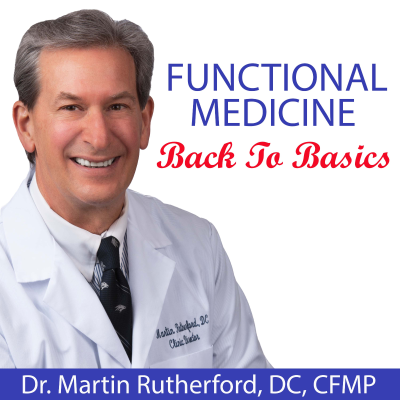
Power Health Talk with Dr. Martin Rutherford
Podcast de Dr. Martin Rutherford, DC : Functional Medicine Practitioner
Disfruta 90 días gratis
4,99 € / mes después de la prueba.Cancela cuando quieras.

Más de 1 millón de oyentes
Podimo te va a encantar, y no sólo a ti
Valorado con 4,7 en la App Store
Acerca de Power Health Talk with Dr. Martin Rutherford
Treating the Individual and Not the Diagnosis – The Results Speak for Themselves
Todos los episodios
231 episodioshttps://www.youtube.com/watch?v=BgrHBqV0ij8Note: The following is the output of a transcription from the video above. Although the transcription is largely accurate, in some cases it is incomplete or inaccurate due to inaudible passages or transcription errors. If you are interested in scheduling a consultation with Dr. Rutherford please visit http://PowerHealthConsult.com [http://PowerHealthConsult.com] Hey Dr. Rutherford here today and I’m going to be a little jacked up because this is going to be a little bit of a venting for me so the title today is stop chasing symptoms now a lot of you have probably figured that out at least you think um a while ago i mean that’s that’s that’s been the whole medical world for as long as i could remember and and and frankly i’ve been thinking about this a lot in the medical world was correct for a long period of time when i look at things now and i look i i sat there last night and i was looking through google i was looking through functional medicine i was looking through thyroid i was looking through leaky gut and i’m looking at stuff and i’m going this is not for today’s present population of chronic condition patients what do you mean dr rutherford i mean i mean you know i mean you know you’ve been talking about leaky gut since the day you were functional medicine practitioner i mean what do you mean about that what do you mean sibo you’ve talked about sibo i do but i talk about it in a certain context of an entire frame of reference that’s called functional medicine and functional medicine is no longer about chasing symptoms and that’s what the medical profession has been about and then you know to their defense they were about fixing broken legs and then having heroic surgeries and heart transplants and then making drugs that got rid of symptoms because nobody knew any different but when you really look at it the healthcare system the alternative healthcare system has as a lot of it has followed that model when i look online and i look at certain well-known websites which i was looking at last night it’s like magnesium here’s the 12 things you can do for me that magnesium does and the next thing you do is you can take that magnesium it’s going to work and it does for most people for just a short period of time and when i say most people i’m talking about the patients who walk in here and i’m talking about the patients who are looking online today because those patients are like they’re they’re the chronic mystery patients there i i looked at three histories this morning i uh something happened and i put on i put on what was 80 pounds in three months how do you put on 80 pounds in three months i know okay and it ain’t gonna and and just like and the doctors told me it’s my thyroid not to worry about it they told me not to worry about it because it’s easy to take care of so they’re taking the medication it’s not working they’re taking the pills it’s not working it’s not gonna work so a new model was made it’s called functional medicine which is another whole thing because not everybody out there is pregnant a classic functional medicine model everybody’s got their own take on it because it’s not a regulated discipline and so you know you can go down the street somebody can rub your knees somebody can rub your back and give you a couple of pills and go i’m a functional medicine practitioner literally you can do that in in like most of the states so this is what i have to deal with so people coming in and they have like fibromyalgia peripherally chronic fatigue they got a bad gut they they can’t they either can’t get away from the bathroom you know for more than an hour or they can’t go for a week and and all this type of stuff and and they come in with bags of supplements okay and and and they push those bags at me and i look at them and i go don’t you shop to me don’t even come to me because that’s not the model the model that was uh produced was based on the fact that we have a new patient population i go back that you’re looking at google you’re look to me 80 of stuff i looked at last night online is not relevant to the present patient population and why is that because auto immunity has changed the rules of the game big time the the the doctors don’t know what to do with it yet the medical doctors don’t know what to do with that because their model which was appropriate at a time before autoimmunity when the person would come in with a flu or a cold or a stomachache or or an earache or you know they were chickenpox or something like that that was their world that’s how it developed but that world’s past them now this is now i’m not saying i’m not saying medicine’s not relevant i’m just saying for the chronic condition patient that is not that is not the the the best model and substituting a supplement for a pill for a symptom okay is not the right model it can give you temporary lease yes am i okay with that of course who doesn’t want temporary relief but when you come to me i’m into more than temporary relief look it’s genetics it’s it’s it’s the person living an unhealthy lifestyle whether they knew it or not do i drink coffee do i not drink coffee do i take salt away not take salt sugar batter sugar not that and i i is is out oh i drink one alcohol a day it’s good too alcohol bad no three alcohol i mean like it’s confusing so you could be uh following an unhealthy lifestyle not even knowing it and and either way it’s an unhealthy lifestyle the next thing you know your systems start breaking down and now the way it’s happening is once that gut breaks down the next thing you know you start getting you can start getting chemical sensitivities the next thing you know you are now open to getting autoimmunity the next thing you know you have a stress has anybody here been stressed in the last year i get a little stress you get a little like maybe get an argument and your stress is already up because your presidential guy lost their one or whatever or you’re or we got coveted you’ve been sitting in your house for six months which is not natural for us as human beings to have to do that type of stuff i don’t think that’s like like a controversial thing and so the next thing you know you have a trigger um you have an overwhelming infection you get copied i think a lot of these coveted people are getting it and they have these mystery symptoms later i think you’re going to find out those mystery symptoms are they had a genetic propensity develop autoimmunity and now here it is this is a new development in our society and frankly i treat people from all over the country and all over the world it’s everywhere it’s not just here okay so now this person comes to us and we have spent years years and years just trying to figure out how do we get that under control and i think we’ve got a pretty good model going and the model is not based on on symptoms the understanding of the case is based on symptoms i give out a close to 300 question questionnaire to my patients to fill out by the time that question is filled out a pretty good idea what’s going wrong with them and it’s it’s it’s it’s it’s it’s and it’s all symptoms however those symptoms lead us to understand what systems have collapsed because these systems these these autoimmune problems they are not going away they’re getting more i’m seeing them in three and four and five-year-olds now you can’t cure at least not right now nobody’s come up with a cure now and um and and so basically you have to dampen it you have to get you have to do your best to get that person out of a uh out of a flare um some people have been on a flare for like 10 years okay and you have to get them out of that you have to get them in you have to try to get them in remission and show them how to stay that way we have we have done that we do that pretty well not everybody’s a candidate i’d say 80 people who call here are candidates and i’d say 20 for a variety of about 20 reasons just are not going to respond to this model of care now i said all that to say this so we get into the model we start treating people and and the person starts getting better and then maybe we switch into so basically the way it works is you’ve heard me say this if you watch this for a long time there’s a hierarchy to treatment we figure out what systems there are how do we get the immune system under control dampen the most it’s going to be lifestyle changes it’s going to be nutraceuticals it’s going to be it’s going to be a chemical toxicities it’s going to be triggers that we have to get rid of dietary changes with the uh that are going to help to get rid of strains and we have a very organized way of going about it and we do it in stages and you maybe maybe you know maybe you could do first stage one and also versus doing a lot better and then and then maybe in stage two i’m talking about not standard stages i’m talking about in that person’s particular case and now maybe you find that there’s a liver that’s not you know playing ball with us so maybe we have to go in there a little harder next thing you know you give a person an extra set of vitamins i’m not going to talk to them again for two or three weeks the next thing you know they’re not feeling good for three or four or five or six or seven days so what do they do they go back to dr google they go back to the model that’s failed they go back to the model of i’m going to go home and i’m going to go and i’m going to take this because this has helped me in the past in the context of what i do that’s not a good thing because what we’re doing is is changing physiology and physiology is very very uh communicative to the person who is doing classic functional medicine and if that’s and and it might be that that physiology is good because finally that organ is starting to like be demanded upon to get better and and and and so in the end that that person just kind of has to let me know send me an email do something say you know what i’ve had i’ve had some discomfort for the last three days and um i think i’m gonna take you know these five pills because they’ve helped me in the past and uh what do you think about that and then i would look at the five pills and go probably not a good idea you know or i might say you know one of those might be a good idea that might be the next thing but why don’t we wait a week why don’t we let because the whole idea is to get your physiology working as much as possible online now i have adopted an approach of more supplements in the beginning and tapering them down and tapering them down tapering down as the body heals but see people come in here you got they got like problems for 10 or 20 years you think it and and and we’re trained i take the drug and it either makes me feel better or makes me feel yucky and i tell the doctor he’s an idiot okay so but so so we have that model so so it’s we’re so like about the symptom and and and we’re so like to put band-aids on thing but in the framework of unraveling your physiology of getting these these multiple vicious cycles under control to start synchronizing tierra i mean you know i might have a patient who has doesn’t have constipation develop constipation that tells me something i might have a patient who has alternating constipation diarrhea go away like in a day it might take three weeks it depends on that case as to what’s normal for that and and so i i just there’s there’s a couple of things that really really make it difficult when you’re dealing with a functional medicine practitioner so i’m so i’m kind of like this is like my my my anthem for you for all of the functional medicine practitioners who are actually practicing functional medicine you give them if give them uh you know give them all the data that you can but don’t switch from one model to the next model in the middle don’t go from fixing systems getting your whole body to start working in sync again getting your gut under control and all of a sudden the endotoxins go away and next thing you know your joint pain goes away but now you’re going to the next step and the next step starts getting toxins out of your fat cells and now your joint pain comes back so now you go back to taking your your your magic you know whatever urban botanical gets rid of the joint thing which is fine but it takes away the markers that the functional medicine person needs to know what is the next something what is the next what is the next step so i mean in the end it’s it’s it’s you have to i mean like you have to when you go into functional medicine if you go to a practitioner that you feel confident in that has a plan that is an organization that talks the way we talk that then then you have to work with their model you can’t and again the people who have a lot of knowledge of um of what’s on the internet and and and and people who maybe don’t know how to read maybe maybe think they know how to read blood panels but they don’t i’m thinking largely of like one particular patient who has massive blood sugar problems but her blood tests are normal and then and i’m hearing like no i don’t have a blood sugar problem well we can’t go forward with this you can have you can have pre-diabetes for 10 years before it shows up on the blood pound you have to trust your doctor on that that’s what functional medicine is about it’s about catching all of these cycles and all of these systems that aren’t functioning properly before they get to the point where they show up on the blood test to where your f where your doctor when you read your blood test and he goes like that he goes oh yeah your a1c is up so we need to give you metformin we need to fix that long before that happens and your symptoms are telling us about that we understand that so when we say look i know your glucose is normal and i know your hba1c is normal for those of you are not aware those are two common but not always comprehensive blood markers um if they can be totally normal on your test and you can have you can have high or low blood sugar okay and and and you’re gonna allow your doctor to go with that so i mean this is a new world and it’s and and the thing is that you can’t you can’t chase you cannot chase symptoms and you cannot strictly chase blood markers and you have to and and and if my when my patients are you know what drives me crazy is is is i’ll be treating and and the person will be getting better then all sudden i’ll get an assessment form and it’s totally off the off the charts um then you know i’ll be waiting for the next time that i talk to them and then i understand and then they start telling me about about well you know i had this so i went back and i took this this uh this particular product because that made me move my boss three years ago but it’s not making me move my bowels now and or or i took i took a product and i felt good for like three days i started sleep again everything was wonderful now i’m doing it and and and now i’m back to where i was and and and i’ve stopped that product but it hasn’t changed anything that’s what functional medicine spent years years and some some of those brilliant people on this planet who had the courage to go ahead years and light years ahead of time getting their teeth kicked in getting getting criticized getting uh getting getting told that they were doctor wannabes and believe me being on this side at that point in time is not fun but they need to get that patient and what do they do they they call you and they say like it’s not working no no it it is working you’re not working your your decision to go back to another model is not working and so you have so either like decide to do your functional medicine practitioner do what they tell you to do or don’t do it is like is like my it’s like my advice i definitely am on a rant right now and so uh but but i’m i’m you know what i want my patients to get better oh and the other thing is they’ll go like i’m not i’m not i’m not uh i’m not getting better i have to go through their whole file make sure i’m not missing anything make sure i’m not losing my mind and then i’ll schedule an appointment to uh to to discuss the whole thing with them and say look here you know like what i’m telling you right now so maybe i’ll be able to use this and just tell them look on youtube for my rant and uh and and then have that conversation then they’re upset because i charge you for a console you know it’s like well i wouldn’t have to charge for the console if you just did what i tell you to do what i asked you to do because i’m going to ask you to do something it’s going to go better or it’s going to go worse if it goes worse that tells us something that is diagnostic that is functional medicine if you and it’s either a supplement or you got off of your diet or you were stressed that day which one was it oh it could be all of those things yes it could be all of those things a lot of times when people call me after they’ve been out of here for just that one last night and the young man was just phenomenal when he left and all of a sudden he’s starting to have symptoms again we talked for like 15 minutes he was stressed he was stressed at work that was it stress through off his blood sugar blood sugar thrown off his sleep what is he doing he’s taking supplements for each one of those things okay this is what i’m talking about all right and he’s delightful just in case you’re watching you know who you are he’s absolutely delightful and and and truly it was it was it was a cool thing because he he did call and he grasped it right away okay and he kind of felt sheepish because i had already given him what to do if something like that happened he goes oh i should have done this i go it’s okay next time do that you won’t have to call me and pay me for a consul and then yell at me because you’re paying me for a console so that’s my rant for today i don’t even remember what the name of the topic was it was but that’s my rant for today look this is a new world if you have these chronic conditions you’ve been to the doctor they don’t know what’s going on with you you’re taking the medications it’s not working you’re coming in here to me with three bags of supplements that’s not working you don’t want to go back to those two models when we’re in the middle of doing what we’re doing when any functional medicine practitioner you know oh the functional medicine practitioner well you know there’s good and bad functional medicine practitioners like everything else on planet earth okay it still gives them the best shot of helping you if you don’t if you resist the temptation to go back to that model and honestly if if if it’s going to be we have signs around this office it says we didn’t say it was going to be easy we said it was going to be worth it i mean because we know there’s going to be tough days when people are getting through that we tell them that in the beginning but that seems to like be forgotten sometimes you know so i’m not talking the vast majority of my patients but i’m talking to a percentage and i don’t like when my patients don’t get better because they’re shooting themselves in the foot and then they shoot themselves on the foot and maybe they even blame me but either way i don’t like that i don’t like that they’re not getting better because they could be getting better if they weren’t continuing going back to that model so so it’s not about it’s not about symptoms it’s about correcting the system it’s about correcting the vicious cycles it’s about correcting the inner twining as my mentor would say intertwining webs of of of conditions that that all come together to create these these chronic symptoms and and it’s it’s a whole different animal and it’s and it’s a whole different model so that’s my rant i’ll be interested to hear what anybody thinks about this one and i’ll be okay with whatever you throw at me and uh and so i’ll be with you again next time with uh uh hopefully is equally illuminating but maybe less controversial subject you – Hey, Dr. Rutherford here today. And I’m gonna be a little jacked up, because this is gonna be a little bit of a venting (laughs) for me. So, the title today is “Stop Chasing Symptoms.” Now, a lot of you have probably figured that out, at least you think (laughs) a while ago. I mean, that’s been the whole medical world for as long as I can remember. And frankly, I’ve been thinking about this a lot, the medical world was correct, for a long period of time. But when I look at things now, and I look at. .. I sat there last night, and I was looking through Google, I was looking through functional medicine, I was looking through thyroid, I was looking through leaky gut, and I’m looking at stuff and I’m going, “This is not for today’s present population of chronic condition patients. ” Well, what do you mean Dr. Rutherford? I mean, you know…. I mean, you know, you’ve been talking about leaky gut since the day you were functional medicine practitioner. I mean, what do you mean about that? What do you mean CBO? You’ve talked about CBO. I do, but I talk about it in a certain context of an entire frame of reference that’s called functional medicine. And functional medicine is no longer about chasing symptoms, and that’s what the medical profession has been about. And then, you know, to their defense, they were about fixing broken legs, and then having heroic surgeries, and heart transplants, and then making drugs that got rid of symptoms, just because nobody knew any different. But when you really look at it, the healthcare system, the alternative healthcare system, a lot of it has followed that model. When I look online and I look at certain well-known websites, which I was looking at last night, it’s like magnesium. “Here’s the 12 things you can do for that… Magnesium does.” And then next thing you knew, is you can take that magnesium, it’s gonna work. And it does, for most people, for just a short period of time. And when I say most people, I’m talking about the patients who walk in here, and I’m talking about the patients who are looking online today, because those patients are like, they’re the chronic mystery patients. I looked at three histories this morning. Something happened and I put on, I put on, what was it? 80 pounds in three months. How do you put on 80 pounds at three months? I know. Okay. And it ain’t gonna. .. And she’s like, “And the doctors told me is my thyroid not to worry about it. They told me not to worry about it because it’s easy to take care of.” So, they’re taking a medication, it’s not working, they’re taking the pills, it’s not working, it’s not gonna work. So, a new model was made, it’s called functional medicine, which is another whole thing, because not everybody out there is a practitioner, and got a classic functional medicine model. Everybody’s got their own take on it because it’s not a regulated discipline. And so, now you can go down the street, somebody can rub your knees, somebody can rub your back and give you a couple of pills and go, “I’m a functional medicine practitioner.” Literally, you can do that in like most of the States. So, this is what I have to deal with. (laughs) So, people are coming in, and they have like fibromyalgia, peripheral neuropathy, chronic fatigue, they got a bad gut. They either can’t get away from the bathroom, you know, for more than an hour, or they can’t go for a week, and all this type of stuff. And they come in with bags of supplements. Okay? And they push those bags at me, and I look at ’em and I go, “Don’t you show ’em to me. Don’t you show ’em to me because that’s not the model. ” The model that was produced, was based on the fact that we have a new patient population. I go back to you’re looking at Google, you’re looking… To me, 80% of stuff I looked at last night, online, is not relevant to present patient population. And why is that? Because auto immunity has changed the rules of the game, big time. The doctors don’t know what to do with it yet, the medical doctors don’t know what to do with it, ’cause their model, which was appropriate at a time before auto-immunity, when the person would come in with a flu, or a cold, or a stomach ache, or an earache, or, you know, we got the chickenpox or something like that, that was their world, that’s how it developed, but that world’s past them now. This is now, I’m not saying medicine’s not relevant, I’m just saying for the chronic condition patient, that is not the best model. And substituting a supplement for a pill for a symptom, okay, is not the right model. That, it kinda gives you a temporary relief. Yes. Am I okay with that? Of course, who doesn’t want it temporarily relief. But when you come to me, (laughs) I’m into more than temporary relief. Look, it’s genetics, it’s the person living an unhealthy lifestyle, whether they knew it or not. Do I drink coffee? Do we not drink coffee? Do I take salt, do I not take salt? Is sugar bad, is sugar not bad? Is alcohol. I drink one alcohol a day, it’s good, two alcohol bad, or three alcohol? I mean, like it’s confusing. So, you could be falling in an unhealthy lifestyle not even knowing it. And either way, it’s an unhealthy lifestyle. And next thing you know, your system started breaking down, and now the way it’s happening, is once I got breaks down, the next thing you know, You can start getting chemical sensitivities, the next thing you know, you are now open to getting auto-immunity, the next thing you know, you have a stress. Has anybody here had been stressed in the last year or so? A little stress, a little… Maybe you get in an argument and your stress is already up because you’re presidential guy lost or won, or whatever, or we got COVID, and you’ve been sitting in your house for six months, which is not natural for us as human beings, to have to do that type of stuff. I don’t think that’s like a controversial thing. And so, the next thing you know, you have a trigger, you have an overwhelming infection, you get COVID, I think a lot of these COVID people are getting it, and they have these mystery symptoms later. I think they’re gonna find out those mystery symptoms are, they had a genetic propensity develop auto-immunity, and now it is. This is a new development in our society. And frankly, I treat people from all over the country and all over the world, it’s everywhere, it’s not just here, okay? So, now this person comes to us and we have spent years, years, and years, just trying to figure out how do we get that under control? And I think we’ve got a pretty good model going. And the model is not based on symptoms. (chuckles) The understanding of the case is based on symptoms. I give out at close to 300 question, questionnaire to my patients to fill out. And by the time that question is filled out, I’ve pretty good idea what’s going wrong with them, and it’s all symptoms. However, those symptoms lead us to understand what systems have collapsed, because these systems, these auto-immune problems, they’re not going away, they’re getting more, I’m seeing them in three, and four, and five-year-olds now. You can’t cure, at least not right now, nobody’s come up with a cure now. And so, basically, you have to dampen it, you have to get… You have to do your best to get that person out of a flare. Some people have been on a flare for like 10 years. Okay. And you have to get them out of that, you have to get them… You have to try to get them into remission, and show ’em how they can stay that way. We have done that, we do that pretty well. Not everybody’s a candidate, I’d say 80% of people who call here are candidates. And I’d say 20% for a variety of about 20 reasons, just are not gonna respond to this model of cure. Now, I said all that to say this. (laughs) So, we get into the model, we start treating people, and the person starts getting better, and then, maybe we switch ’em to… So, basically, the way it works, is you’ve heard me say this, if you watch this for a long time, there’s a hierarchy to treatment, we figure out what systems they are. How do we get the immune system under control, dampen the most, it’s gonna be lifestyle changes, it’s gonna be nutraceuticals, it’s gonna be a chemical toxicities, it’s gonna be triggers that we have to get rid of, dietary changes that are gonna help to get rid of, treat. And we have a very organized way of going about it, and we do it in stages. Maybe you could do first stage one, and all of a sudden the person’s doing a lot better. And then maybe you get to stage two. I’m talking about not standard stages, I’m talking about in that person’s particular case. And now, maybe you find that there’s a liver that’s not, you know, playing ball with this. So, maybe we have to go in there a little harder, the next thing you know, you give a person the XR starter vitamins. I’m not gonna talk to them again for two or three weeks, the next thing you know, they’re not feeling good for three or four, or five, or six, or seven days. So, what do they do? They go back to Dr. Google, they go back to the model that’s failed, they go back to the model of I’m gonna go home and I’m gonna go, and I’m gonna take this, because this has helped me in the past. In the context of what I do, that’s not a good thing, because what we’re doing is changing physiology. And physiology is very, very communicative to the person who is doing classic functional medicine. And it might be that, that physiology is good, because finally, that organ is starting to like be demanded upon to get better, and so, in the end, that person just kinda has to let me know. (laughs) Send me an email, do something, say, “You know what? I’ve had some discomfort for the last three days, And I think I’m gonna take, you know, these five pills because they’ve helped me in the past. And what do you think about that?” And then, I would look at the five pills and go, “Probably, not a good idea.” You know? Or I might say, “You know, one of those might be a good idea. That might be the next thing, but why don’t we wait a week?” Why don’t we let? ‘Cause the whole idea is to get your physiology working as much as possible online. Now, I have adopted an approach of more supplements in the beginning, and tapering them down, and tapering them down, and tapering down as the body heals. But see people come in here, they got the problems for 10 or 20 years, and we’re trained. I take the drug and it either makes me feel better, or it makes me feel yucky, and I tell the doctor he’s an idiot. Okay? So we have that model. So, we’re so like about the symptom, and we’re so like put the band-aids on things, but in the framework of unraveling your physiology of getting these multiple vicious cycles under control to start synchronizing to you. I mean, you know, I might have a patient who doesn’t have constipation, develop constipation, that tells me something. I might have a patient who has alternating constipation, diarrhea go away (snaps) like in a day, it might take three weeks. It depends on that case as to what’s normal for that. And so, there’s a couple of things that really, really make it difficult when you’re dealing with a functional medicine practitioner. So, I’m kinda like, this like my anthem for you, for all of the functional medicine practitioners, who are actually practicing functional medicine. You know give them all the data that you can, but don’t switch from one model to the next model in the middle. Don’t go from fixing systems, getting your whole body to start working in-sync again, getting your gut under control, and all of a sudden, the endotoxins go away, and the next thing you know, your joint pain goes away. But now, you go onto the next step, and the next step starts getting toxins out of your fat cells, and now, your joint pain comes back, so now, you go back to taking your magic, you know, whatever urban botanical gets rid of the joint thing. Which is fine, but it takes away the markers that the functional medicine person needs to know, what is the next step? So, I mean, in the end, it’s, you have to… I mean, like you have the… When you go in the functional medicine, if you go to a practitioner that you feel confident in, that has a plan, that as an organization, that talks the way we talk, then you have to work with their model. You can’t… And again, the people who have a lot of knowledge of what’s on the internet, and people who maybe don’t know how to read, maybe think they know how to read blood panels but they don’t. I’m thinking largely of like one particular patient who has massive blood sugar problems but their blood tests are normal. And I’m hearing like, “No, I don’t have a blood sugar problem. ” We can’t go forward with this. You can have pre-diabetes for 10 years before it shows up on the blood panel, you have to trust your doctor on that, that’s what functional medicine is about. It’s about catching all of these cycles and all of these systems that aren’t functioning properly, before they get to the point where they show up on the blood test, to where your doctor, when he reads your blood test, and he goes like that, and goes, “Yeah, your A1C is up, so we need to give you Metformin. ” We need to fix that long before that happens. And your symptoms are telling us about that, we understand that. So, when we say, “Look, I know your glucose is normal, and I know your HbA1C is normal. ” For those of you aren’t aware, those are two common, but not always comprehensive blood markers. They can be totally normal on your test and you’re gonna have high or low blood sugar. Okay? And you’re gonna allow your doctor to go with that. So, I mean, this is a new world and it’s, and the thing is that you can’t chase, you cannot chase symptoms, and you cannot strictly chase blood markers, and you have to… When my patients are, you know, what drives me crazy, is I’ll be treating, and the person will be getting better. And then all of a sudden, I’ll get an assessment for ’em, and it’s totally off the charts. Then, you know, I’ll be waiting for the next time that I talked to them, and then I understand, and then they start telling me about, “Well, you know, I had this, so I went back and I took this particular product because that made me move my bowels three years ago but it’s not making me move my bowels now. ” Or, “I took a product and I felt good for like three days. I started sleeping again, everything was wonderful, but now I’m doing it, and now I’m back to where I was. and I stopped that product but it hasn’t changed anything. ” That’s what functional medicine spent years, years. And some of those brilliant people on this planet who had the courage to go ahead years, and light years ahead of time, getting their teeth kicked in, getting criticized, getting told that they were Dr. Wannabes. And believe me, being on this side, at that point in time, is not fun. But they gonna get that patient, and what do they do? They call you and they say like, it’s not working. (laughs) No, no, it is working, (chuckles) you’re not working. Your decision to go back to another model is not working. And so, you ha… So, either like decide that your functional medicine practitioner do what they tell you to do, or don’t do it. Is like my (laughs) advice. I definitely, am on a ramp right now. And so… You know what? I want my patients to get better. And the other thing is they’ll go like, “I’m not getting better.” I have to go through their whole file, make sure I’m not missing anything, make sure I’m not losing my mind. And then I’ll schedule an appointment to discuss the whole thing with them and say, “Look, here, you know, like what I’m telling you right now.” So, maybe I’ll be able to use this and just tell them, look on YouTube for my rant. And then have that conversation, and then they’re upset because I charged them for a consult. You know, it’s like, why wouldn’t I have to charge you for the consult? If you just did what I tell you to do, what I asked you to do, because I’m gonna ask you to do something, it’s gonna go better, or it’s gonna go worse. If it goes worse that tells us something, that is diagnostic, that is functional medicine. And it’s either a supplement, or you got off of your diet, or you were stressed that day, which one was it? It could be all of those things. Yes, it could be all of those things. A lot of times when people call me after they’ve been out of here for… I just had one last night. And the young man who was just phenomenal when he left, and all of a sudden, he’s starting to have symptoms again, we talked for like 15 minutes. He was stressed, he was stressed at work. That was it, stress threw off his blood sugar, blood, sugar throwing off his sleep. What is he doing? He’s taking supplements for each one of those things. Okay. This is what I’m talking about. All right. And he’s delightful, just in case you’re watching, you know who you are. (laughs) He’s absolutely delightful. And truly, it was a cool thing, because he did call, and he grasped it right away. Okay. And he kinda felt sheepish, because I had already given him what to do. If something like that happened, he goes, “I should’ve done this.” I go, “It’s okay, next time do that. You’ll have to call me and pay me for a consult, and then yell at me because you pay me for or consult.” So, that’s my rant for today. I don’t even remember what the name of the topic was, it was. (laughs) But that’s my rant for today. Look, this is a new world. If you have these chronic conditions, you’ve been to the doctor, they don’t know what’s going on with you. You’re taking the medications, it’s not working. You’re coming in here to me with three bags of supplements, that’s not working, you don’t wanna go back to those two models, when we’re in the middle of doing what we’re doing. When any functional medicine practice. .. (mumbles) “You know, it was a functional medicine practitioner,” they went, “Well, you know, there’s good and bad functional medicine practitioners like everything else on planet earth, okay?” It still gives them the best shot of helping you, if you don’t, if you resist the temptation to go back to that model. And honestly, if it’s gonna be, we have signs around this office, it says, “We didn’t say it was gonna be easy, we said it was gonna be worth it.” I mean, ’cause we know there’s gonna be tough days when people are getting through that. And we tell ’em that in the beginning, but that seems to like be forgotten sometimes. You know? So, I’m not talking to the vast majority my patients, but I’m talking to a percentage, and I don’t like when my patients don’t get better, because they’re shooting themselves in the foot. And then they shoot themselves in the foot, and maybe they even blame me. But either way, I don’t like that. I don’t like that they’re not getting better, because they could be getting better if they weren’t continuing going back to that model. So, it’s not about symptoms, it’s about correcting the system. It’s about correcting the vicious cycles, it’s about correcting the inner twining. As my mentor would say, “Intertwining webs of conditions that all come together to create these chronic symptoms. ” And it’s a whole different animal, and it’s a whole different model. So, that’s my rant. I’ll be interested to hear what anybody thinks about this one, and I’ll be okay with whatever you throw at me. And so, I’ll be with you again next time with… hopefully, as equally illuminating, (laughs) but maybe less controversial subject. Source : Youtube [https://www.youtube.com/watch?v=BgrHBqV0ij8 ]
https://www.youtube.com/watch?v=CQ-SpO4rE_QNote: The following is the output of a transcription from the video above. Although the transcription is largely accurate, in some cases it is incomplete or inaccurate due to inaudible passages or transcription errors. If you are interested in scheduling a consultation with Dr. Rutherford please visit http://PowerHealthConsult.com [http://PowerHealthConsult.com] So today, we’re gonna talk about something that isn’t gonna sound very sexy but you need to manage your blood sugar, period. I’m morphing more into doing a little bit more education on blood sugar because over this past year so many of the cases that came in here were their success just hung on the ability of us to get their blood sugar correct. And people would commonly say, “Well, I don’t have a blood sugar problem” (laughs) I’ll say, Well you filled out my assessment form and there’s 16 symptoms on there that would indicate that you have a blood sugar problem if you mark them down and you have all of them. So then the next retort from the patient is usually, but my blood tests are normal kinda like the Hashimoto’s thing. And I’m telling you that is so common. I found that when I get patients from other practitioners, alternative practitioners and functional medicine practitioners, the first thing I look at now is the blood sugar because it’s just not really emphasized the way that it should be. Why is it important? First of all, blood sugar is used by every single every single cell in your body. We did a back to basics of functional medicine I did do a segment on blood sugar. I think this one’s gonna sound a little different than that one, but in the end in that segment we talked about how blood sugar is foundational to everything. Every cell in your body needs proper balance of blood sugar every single cell in your body has insulin receptors so that sugar can get in there. And sugar works with your, the mitochondria these little energy mechanisms in your cells to create energy. Okay, too much blood sugar is not good too little blood sugar is not good. Hyperglycemia, hypoglycemia. Well I don’t have hypoglycemia. The vast majority of patients who come in here have hypoglycemia. But their numbers are normal. If you look at that… And so this goes back to the functional medicine model has different ranges but even within the functional medicine ranges A lot of times the lab tests are normal while this person is sitting there if I don’t eat, I get irritable, shaky, I wanna choke my wife or my husband, I get agitated, I get anxiety, I crave sweets, and you cannot even begin to go into all of the things that physiologically are affected by that. For example, your thyroid hormones can’t convert properly into active thyroid hormones in other words you’ve got a perfectly normal thyroid and yet if your blood sugar’s off, your thyroid hormones may not be converting into the proper form to actually activate your energy in your cells. If your blood sugar’s fluctuating all over the place, you may not be able to make the proper neurons in your brain to be happy, to be motivated. If you don’t have them, you may be you may have anxiety, you may have a. .. even as much as panic attacks So the blood sugar is incredibly important. I think the thing that I’m wanting to say today is most of you have normal blood sugar tests. People come in here I mean like 70% of people come in here that blood sugar abnormality is a big part of their symptom picture that they’re coming in here for. Whether it’s Hashimoto’s or another autoimmune disease or gut problem and no one’s even talked to them about it. Because the blood tests were normal. And so the thing is there’s like seven different levels of blood sugar abnormalities, for a medical doctor to tell you that you have hypoglycemia, low blood sugar I mean you have you be practically dead. I mean, you’re supposed to be like it’s supposed to be the numbers less than 60 or 50 depending on who you’re looking at. By that time, your blood sugars are so low. Your brain is not getting any oxygen from your blood sugar. I’m sorry, your brain’s not getting your blood sugar your muscles aren’t getting any blood sugar and your cells aren’t getting any blood sugar and you’re passing out and you’re getting lightheaded and you don’t feel good and all that Kind of like a diabetic, who hasn’t taken her insulin. And so that’s hypoglycemia They’ll diagnose you with low blood sugar if you come in like that. But the vast majority of you, it’s not like that. The vast majority of you it’s again, if I eat, I feel better. Cause my lecturer comes out. If I don’t eat for long periods of time, I get irritable I get shaky, I get nasty, I get tremors Maybe I get blurred vision (laughs) There’s a number of things that happen when you’ve got low blood sugar that you’d never connect to your blood sugar. And so and the doctors, maybe they run a blood sugar Maybe they don’t. If they run a blood sugar, they go it’s normal. Well, here’s the problem. You may not have as much damage to the receptor sites in your cells to be able to register as low blood sugar on your test. And that’s not a theory. I mean, that’s a fact. Some of the things that I’ve read have said that it may take as much as seven years for you to show up for low blood sugar and or the next sugar problem up the line which is insulin resistance. And here, just to drive you crazy If you have insulin resistance, which you might call pre-diabetes, insulin resistance If you have some other things you might call it metabolic syndrome. It’ll take even longer for the damage to be done for that to show up. So now you have metabolic syndrome You’re overweight your blood pressure’s high, you eat and you fall asleep afterwards. You just crave sugar all the time. You can’t lose weight. You’re urinating all the time and when they do your blood sugar, you’re fine. Or even better they might say, well your diabetes you’re not diabetic type 2 yet. So we’ll just wait until you get to be diabetic. And then we’ll take care of it. In the meantime, you’re having all this damage from being either pre-diabetic or low blood sugar which we call functional hypoglycemia. You’re not dying because you’re below 60 but you have low blood sugar. And every time you don’t eat for hours or you don’t feel like eating first thing in the morning ’cause your blood sugar is in the toilet and it’s setting off as stress response and it makes you nauseous This is damaging tissues. For those of you who watch my Hashimoto’s stuff this is creating inflammatory responses against your thyroid. So the blood sugar is huge. And to make it even better (laughs) if you have low blood sugar and if you have high blood sugar not metabolic syndrome, not diabetes type 2, pre-diabetes, low blood sugar, pre-diabetes they bang back and forth. So then you get symptoms of both. You get symptoms of, I eat, I don’t eat and I get irritable and shaky I eat and then I fall asleep right afterwards. You get a lot of symptoms of… That are very confusing. And so you can have all of those blood sugar symptoms take the test and not have it show up. Now, there is a test that you can run. It’s a three hour test and you take a person’s blood sugar levels and insulin levels over a period of three hours. And usually at the end of two or three hours that person whose lab tests were normal but has all the symptoms will show up. Whether it’s higher or it’s low is that helpful? Yeah, It’s very helpful to me because it helps me to lean my supplementation or my recommendations or my dietary lifestyle recommendations to one or the other. And so, but I cannot emphasize blood sugar enough like you have to follow the fuel. If the person doesn’t have oxygen getting to their cells if a person doesn’t have blood sugar getting in their cells, getting to their cells, you’re gonna have a hard time for that person to get well of anything because they’re not getting enough energy in their cells to really create enough of a response to a healing response so that they can respond to whatever dietary changes or supplementation or lifestyle changes or any of those types of things. So I could go on for blood sugar for a long time. It is so huge. And yet most people have no idea that some of these profound symptoms that they’re experiencing, inability to lose weight. Yeah, it could be thyroid but let me tell you a lot of times it’s that pre-diabetic who’s been told you’re okay. Or you don’t have pre-diabetes or you got pre-diabetes let’s wait until you’re diabetic. We’ll wait for that. That will stop you. That will stop you from losing weight. And there’s so many of those instances so managing your blood sugar is huge. There’s a lot of good stuff online as far as general general things to do for it. But really at some point you need to figure out either symptom-wise or by testing Do I have low blood sugar? Do I have functional hypoglycemia? Do I have insulin resistance? Pre-diabetes, metabolic syndrome, diabetes type 2 or diabetes type 1. That’s blood sugar. It’s a blood sugar. It’s not just like, no I don’t have diabetes. My blood sugar is okay (laughs) It’s way more than that. And believe me in dealing with autoimmunity Hashimoto’s, all the things weight loss all these types of things You better know your blood sugar and you better be addressing if it’s not right. Or a lot of things you’re trying are going to fail. Source : Youtube [https://www.youtube.com/watch?v=CQ-SpO4rE_Q]
https://youtu.be/GEeKFlK0-24In the final segment of Functional Medicine Back to Basics Dr. Rutherford discusses the female hormones. Note: The following is the output of a transcription from the video above. Although the transcription is largely accurate, in some cases it is incomplete or inaccurate due to inaudible passages or transcription errors. If you are interested in scheduling a consultation with Dr. Rutherford please visit http://PowerHealthConsult.com [http://PowerHealthConsult.com] Hi, this is Dr. Rutherford and we are now down to what I believe is the last in the series of functional medicine back to basics that we started several months ago, and thank you for all of your kind words and thank you and I’M glad for those of you say that you’re getting help from this and that it’s, really pretty cool. I really really makes me get up in the morning and do this so female hormones yo-yo. Why? I am. Why is this the last in this series? This is the last in the series because, as my mentors would say, everything flows downstream to the female hormones if female hormones are affected by everything, particularly if you’re, still, menstruating and and to a degree, even if you’re in Menopause and I’m gonna talk about both of those. So let’s. First talk about let’s, just first talk about and female hormones and and like the natural cycle of what a female hormone should look like. So the natural cycle of a female hormone is, I’m gonna start with the brain and, and there’s a there is a structure in your brain called the hypothalamus. What you need to know about the hypothalamus is it &? # 39 s, this, it’s, this little organ in the brain. It’s, not an organ, but it’s. This little this little yeah it’s, an organ in the brain that senses all of the balances of chemicals, particularly hormones in in your system, in your in your bloodstream, and so it senses how much estrogen that a woman has okay and then, if It’s. If, if there’s, not enough estrogen, there then being produced by the ovaries, then your hypothalamus talks to another organ, that’s called your pituitary gland. Many of you may be familiar with it, and that is called the master gland, because it sends signals to all it pretty much controls all the hormones it sends signals to the thyroid. It sends signals out for you to make growth hormone. It sense they goes out for you to make estrogen testosterone. It’s, the master gland. So when it is told that you do not have enough estrogen, it then tells your ovaries to make estrogen okay, but that’s, not the end of it. The over the estrogen then has to be made, and it has to go out to the cells that needed and and and in women, that’s, certainly that it goes. It goes into your brain. It gives you it gives you better mood. Estrogen certainly controls how your ovaries work and, and so because there’s, a lot of feedback in there relative to medical periods and and having them and along with progesterone having proper cycles and and so and then estrogen in women. Well, the next step would be once it hits all of the cells, the frontal lobe cells, and it gives you good mood and and and and and it just ultimately has to be cleared after it goes to all the cells. So it goes through these cells and then it – and so the estrogen goes to the cell. This is a cell, it hits the cell, the cell opens it goes in there. The cell uses it when it when it uses it. It has mechanisms to detox itself to send the the and the unused estrogen and they use it and and the they kind of used estrogen now has to be cleared from your body. This is a very, very, very important, salient point, so it gets so when it gets when it gets cleared. It gets cleared like anything else that gets there’s, a certain pathway in your liver that clears your estrogen. Then it has to be cleared through your gall bladder, because gall bladder takes all of the toxins there’s, bio form, the gall bladder spits it out into your intestines. It has to be cleared through your intestines. There is a there is a enzyme in your intestines called beta glucuronidase that actually further clears your estrogens. If that enzyme is too high, it’ll, actually reconstitute estrogens and make inactive estrogen into active estrogen that was supposed to go into the toilet. The enact that was supposed to go into the toilet or talk about that in a few minutes, so you and then it can go in and then it also can be. Estrogen can also be stored in your fat cells, so women are estrogenic and and and it’s natural for women to have estrogen in their fat cells. There was this kind of cool little mechanism there that if a woman starts getting too much testosterone first before they develop polycystic ovarian syndrome, which is caused, which is it has too much testosterone as a feature it’ll, get stored in your fat. In your fat cells in your adipose tissue, and so this is the cycle of estrogen, and you have to kind of remember that, as as I’m walking through this, so so things that affect any of those. Any of those processes are going to alter your estrogen function, so I think today I guess the next, because the next step to go to is today most people come in here with female hormonal problems. Aren’t coming in here, expecting that I’m, going to talk to them about their liver or talking to them about their their intestinal dysfunction. We’re talking to them about blood, sugar or essential fatty acids or all of the things or their stress, or all of the things that ultimately go into making your hormones. They’re, not usually expecting me to talk to them about their cholesterol, and this is a point that I don’t see made enough today we are, we are subject to a whoever makes these decisions that are making this decision, that Our cholesterol should be down below 150 or 100, and that’s. Incorrect based on the understanding of physiology, because when your cholesterol starts getting down that low – and this happens in a lot of thin patients when it gets down that low and your doctors telling you how great it is, it’s, pretty well understood that That bulow, 150 and cholesterol – it’s, difficult to make hormones. Almost all of our hormones are made out of cholesterol. They’re. Almost all of our hormones made out of something called cholesterol. I’m pregnant alone, and, and so so these are all things that in the functional world we look at if a person is coming in here with scanty blood flow, excessive blood flow they’re coming in here with periods that are All over the place they’re coming in here with facial, hair and and acne, and we might be looking at and we’re gonna talk about polycystic ovarian syndrome in a separate in a separate video. So it’s, not technically going to be part of this series, but we’re going to talk about that, and actually we have videos online already on polycystic ovarian syndrome. If you want to look those up, but you so we could be talking about polycystic ovarian syndrome there, which also has a lot to do with all of these imbalances and all these organs that I talked about. But we’re, going to be looking. First, at all of those things, because, because all of them have our play a role in particularly in the menstruating female, all of those play a role in making your in making your estrogen balanced. So if you are, if let’s, so let’s. Say you’re, not any! Let’s say you’re, not eating of cholesterol. Maybe you went on one of these, like low-fat diets. Low flat diets and and and maybe you’re, really got a lot of low fat and all sudden you start getting all these symptoms like what is going on here and you go and they take your estrogen and your estrogen is low. They give you Harmon replacement therapy, let ‘ S say that your intestines has too much of this enzyme that I briefly mentioned called called beta glucuronidase beta glucuronidase will cause the estrogen that is supposed to have been detoxified and then going into the toilet. Because remember your brain knows how much estrogen you need, but this if this beta glucuronidase is too high because of a number of things that could be going wrong with your intestines, irritable, bowel syndrome, SIBO any of the autoimmune diseases like celiac or cross, or anything like That you’re, going to reconstitute your estrogen before it goes into the toilet, and it’s, going to be reabsorbed, and you’re, going to be estrogenic. You’re gonna have too much estrogen too much estrogen by the way, creates the same symptoms, frequently as too little estrogen, and the reason is because if you take a Carmo replacement therapy and and and you have again in the cycle of what The hormones supposed to do is supposed to be made and that’s supposed to be used by being used, and the hormone actually gets on this little protein. It gets over here to the cell and then there’s, an enzyme that cleaves that off and then the cell goes opens up and it goes in. But if you, if you give yourself too much estrogen like from creams and stuff, then that estrogen will cause this to become resistant, this receptor site, you know, like I got enough – I’ve got enough, and eventually this receptor site just won’t open if it doesn ‘ T open and estrogen is not getting in. You’re going from you and and they take and they take it and they take a lab of your estrogen or going like. Well, you’re, a she’s like 900. You have like too much of it. You’re and and and you’re, getting like low estrogen symptoms. This is why, and it’s and it’s fairly common. If somebody comes in – and I’ll put this in line with what we’re talking about. If we’re looking at their intestines for the beta glucuronidase, if someone comes in here on what we call you know, post birth control syndrome, someone comes in here. They want to have a baby there. They’ve, been taking birth control pills for ten years. We have to like take like three months to clear all of the estrogen out of their system, so that so that we can get a proper feedback loop going between their brain and their ovaries. So that we can now give them the proper supplements, in fact, when we do that and we do and we and we work with their intestines, we work with their liver. We work with their gallbladder a lot of times they just, I would say, seventy percent of the time they just the person, the person’s, hormonal balances start to level out. We do we just we just ran kind of a little beta test on a program that we’re thinking of putting out here here in the next few weeks, and it’s really for lack of a better term. It’s, a detoxification program. It’s, a strip all the inflammation program out it’s fairly. It’s, it’s, a it’s, a it’s fairly. Genetic, but we kind of tailor it. We have ways of tailoring its that individual person and we have one of the gals here and she said it’s. Okay. For me to say this, although I’m, not gonna, say her name or anything, we put her on this protocol. She hadn’t had a period in in two and a half years and like within a couple of weeks. She started having her periods again just by clearing out the estrogen just by getting your liver and working and so on and so forth. So let’s go back to so so let’s. Go back to that. I hope I’m. I hope I’m making sense here. So let’s. Go back to estrogen is at the bottom of like the stream, and everything else affects your estrogen. So so, if your livers, not clearing and your gallbladder is not clearing, then you’re, not clearing the estrogen. Now you get to high estrogen right in your system because it’s because it’s not getting cleared out. Now that too high estrogen maybe starts giving you symptoms, or maybe that too high estrogen starts shutting down your receptor, slides and the next thing you know you’ve got signs of too low estrogen, but you got too high estrogen, but they go in There and there you go here – take hormone replacement therapy, but my estrogens high, this is the tool in the medical community is, is to take the hormone replacement therapy period first last and always, and when you, when you take that hormone replacement therapy, it tells your brain. You have enough estrogen that brain then tells your your ovaries, that they can kick back, that they don’t need to make estrogen and then the ovaries start to atrophy next thing you knew you lose that feedback loop between your brain and your ovaries. If you’re younger, if you’re, if you’re, if you’re, a menstruating female that could that’s enough, that that could make you not be able to have children? But the point is is: is that there is that feedback loop? So your ovaries could start to atrophy your your your pituitary gland could start to be not start to not make luteinizing hormone or follicle stimulating hormone, particularly luteinizing hormone and a female. Your your hypothalamus is fine because it’s. Just saying we got a lot of estrogen in here, pituitary gland, take a breath, take a break, take a rest. Go to the each have a few martinis you don’t ever have to work again, because somebody else is doing your job for you. Somebody’s, telling the ovaries to put estrogen, but it’s, not telling the ovaries. The ovaries are doing the same thing: they’re gonna like wow. You know nobody’s talking to me, so the ovaries start to atrophy. They go on vacation too. This is this is the the downside of hormone replacement therapy. I’m, not a hundred percent against it, but I’m only for hormone replacement there being certain in certain in certain occasions. So so I don’t really even run most of the time I don’t really run. I don’t really run female labs when somebody comes in here and they have all these female and they have all the symptoms. The scanty blood flow, the heavy blood flow, abnormal periods, just all of the pre mention’el syndrome. Most the time I don’t even run female labs when they first come in, because I’m gonna be looking at their liver. If their livers gunking up, they’re gonna have too much they’re gonna have too much estrogen your system. I’m gonna look at their gallbladder. If their gallbladder is not working, they’re gonna have too much estrogen resisting. If I’m gonna be looking at their at their intestines, I’m gonna be looking at blood sugar blood sugar has an awful lot to do with the manufacture of of estrogen down the road. I’m gonna be looking at adrenals stress hormones. I just your your secondary sex glands are your adrenals and your adrenals and your blood sugar work together. You can look at that segment and when, when adrenals go up, then blood sugar goes up. When adrenal goes down, blood sugar goes down when your blood sugar is high and low. It affects these things called sex hormone, binding globulin. These are the things that carry or your your estrogen all over the place, and so when you’re stressed and your adrenals are firing off and it’s, causing your blood sugar to be high. It screws with these little taxicabs these sex sex hormone, binding collapses. Now, all the sudden, you’re, not getting estrogen to where you’re supposed to be, and it shows up as low estrogen and it’s. Actually that you’re stressed that’s affecting your adrenals, that’s affecting your blood sugar, and all of that is affecting our female hormone cycles. So again, this is the functional approach and essential fatty acids are important. I will usually in the beginning to a a lab on someone who has these problems to determine if they have enough essential fatty acids in their body, because essential fatty acids, under normal circumstances, sensitize these receptor sites to make them work better so that they don’t get stuck, and so that the and so that the so that the hormone can get in there. So so I don’t really do testing in the beginning, because I’m gonna treat all of the other aspects of what that person presents with and their labs are gonna look much different later on than they would look In the beginning, well, I don ‘ T really need to know what they look like in the beginning, because now, if we do all of that and the person still having imbalances in their female hormone health, okay, then, then you run the labs, because at that point you run the whole lab from the Brain you run the follicle-stimulating hormone. You run that all of the estrogens I run DHEA and I run DHA sulfate. I know you’re at your. Your endocrinologist would say that that’s like stupid. It’s not in and because it tells us what your adrenals are doing and your adrenals are a part of your female stuff. I run a thyroid lab because thyroid helps your again. It helps desensitize your real receptor sites so that your estrogen works properly. So I run a thyroid lab and – and I’m in – and I Brenda obviously testosterone and progesterone. So I run the whole lap to cover that whole feedback loop to see if it’s even working and if it and if this parts not working well, the the then the the elta luteinizing hormone, follicle-stimulating hormone, coming out of your pituitary. There’s, herbs and botanicals for that. If the arbors aren’t, working and and and and and they have an atrophied yet – which you can pretty much tell from from the from the labs there’s power for herbs to balance that out there’s herbs. That actually will balance that out. If you have high testosterone, I’ll, bring it down. If you have low Tesla sorry estrogen high test, high estrogen will bring it down, low estrogen will bring it up, and even and even progesterone. If, if a person’s thought persons losing their Ag if they’re, not if their we got pregnant and can’t carry that’s her there are there’s, herbs and botanicals. For that, so the next step would be to use those herbs and mechanicals based on the labs and then, if all fails, then I think hormone replacement therapy probably is something that needs to be done. I’m, going to tell you follow that whole thing it it rarely fails. I mean it’s, your physiology, it has to work. You just have to figure out what it is. They have to do. Perimenopausal women. Well, so a few few things I want to mention: oh let’s, go to menopausal women. Then I’ll. Go back to that so menopause. When you go into menopause, okay, whether it’s, because you are you’ve turned 50 and you’re going into menopause or whether it’s, because you’ve had a hysterectomy and they’ve, taken everything out. If you know what’s going on, you, rarely rarely rarely ever need to harmone replacement therapy, and I know that for those of you had your ovaries out and your and your uterus out, you probably think I just lost my mind but hear me On this okay, you basically have been put in the menopause. If you’re younger and you’ve had that taken out you’re, not gonna have babies. You’re, not gon. Na cycle anymore. You don’t need a lot of estrogen now what happens when that happens, and what happens when you are when you’ve crossed the bridge into menopause? Is your adrenals take over responsibilities? The baton is handed through. The adrenals takes over your responsibility for managing your sex hormones. Your RINO’s, make estrogen testosterone and progesterone, and, and so so when so so you don’t. They don’t, make anywhere near as much, but you don’t need as much because again you’re, not cycling. You’re, not going through that whole stress on your system. You’re, not gonna have a baby. You don’t need as much estrogen you-you-you need estrogen and you need enough estrogen, but nowhere near as much, and so so. If it’s, the adrenals, then you’re looking to if the baton has been passed, the adrenals in those cases you’re. Looking at the adrenals. Frankly, you’re, looking the adrenals and the blood sugar, because again adrenals and blood sugar kind of track together. So you’re. Looking at you’re looking at and and adrenals are affected by everything. If you have an infection in your body, it affects your adrenals. If you’re stressed, it affects your adrenals. If you have, if you have small intestinal bacteria, we’re gonna affects your adrenals. Everything affects your adrenals. So again, you go back to same thing. You’re still gonna go back to liver, gallbladder, essential fatty acids, blood sugar adrenals. So except this time the adrenals are more prominent. Do I start going in there and throwing adrenal supplements people right away? No, I would see if they ‘ Re stressed. If they ‘ Re really really stressed. I might use some. I do functional neurology too, so I might use some brain rehabilitative neuroplasticity exercises, but there’s, a lot of herbs and botanicals that that can be used for stress and if they’re, not strong enough, then maybe a person needs to Take a medication for that, but but but because the stress hormones are now much more prominent and even in menopause, because the adrenals are the guys and the adrenals are the are the glance and put out all the stress hormones. So stress adrenals, all those other things and the vast majority of time. If the. If the person has not been on hormone therapy for a long time and the audrina and that aspect of their adrenals stops making even the little an estrogen that it makes that the person needs, then they’ll need hormone replacement therapy. One point I want to make on this is I get a lot of women to come in here and they’re like late 30s early 40s, and they’re having a lot of they’re having the the hot Flashes and and and the dogs like you &, # 39 re in early menopause yeah. I I’ve, studied with some pretty profoundly brilliant people. These are people who are in practice. These are people who do research. These are P, some of them specialize in female issues and if they will stay will tell you – and I’m, and I think they are correct is that these women are not in early menopause. They’re, having more significant problems with all of the aspects of the things that I just got them talking about the liver, the gallbladder that most most of the time the intestines are involved Navy. They’re, going through an incredibly stressful period, maybe maybe they’re. They’re, trying to do too many things, and and and and and and and maybe trying to be a mom and and working and taking care of a husband and taking care of kids and and all that type of stuff. And it’s, just hammering their adrenal glands, which in turn is hammering their blood sugar, which in turn is hammering their intestines in earlier. So the vast majority of time that’s, what it is and – and you can and and you can run a panel on a postmenopausal on a menopausal, female and and see what that is now in and the last bit of pieces here is – is In the adrenal glands there’s. This unique setup where your drill glands, are your fight/flight glance. So if your brain goes into fear and and fight/flight, your brain tells your adrenals to start putting out stress hormones to put you in shape to to fight our Flake here’s. The problem, the adrenal glands, are your secondary sex sex glands right. They make your test, they actually even in a female. They make testosterone first and then, and then that and then, without getting through the whole chemical thing. The testosterone eventually is involved with making estrogen and then that’s eventually involved with making progesterone like that. Almost like almost like you pour the cup in you get enough testosterone next thing you know it starts making estrogen next thing. You know it starts making now well here and here’s problem in the adrenal glands alone. If specially, if you’re a menopause, and it is your source for taking care of you as far as getting you enough estrogen you when you’re, when you get stressed and you’re, making cortisol, you can’t make this stuff called DHA. Dha is what makes the testosterone that makes the estrogen that makes the other stuff and DHEA is is is come is a hormone that’s, made from cholesterol and pregnant alone, so there’s. This thing in your adrenals called a pregnenolone steel, and what that means is you’re either making sex hormones or you’re, making stress hormones? You’re, stealing the pregnant alone to make stress hormones, because pregnant alone also goes to make your stress hormone. Cortisol. So stress is a huge, huge part of so many of these female issues that it’s; crazy, that even you, even in the menstruating female, where the test where the adrenals are not the main guys they’re that, like the secondary Size class’stress is a big player. Stress is a big player in this, so I think, yeah and and and one other so so so so you look at all those things and yeah the other thing. We went that you would look at the other thing that we would look at relative to particularly the menstruating female is well. I apprec –, probably save this for the PCOS, but over overtraining overtraining creates a lot. I’m, seeing more and more and more women who are doing crossfit and they’re competing and they’re doing. Of course, this has been for a while, now and and are doing, triathlons and and marathons, and and just all that type of stuff and and and there’s, a balance to training and when women’s start training like that. That will start creating hot flashes, because their estrogen will go love. Yeah, I mean yeah. They they have a hard time having babies if they’re. If they ‘ Re are a female age, because their testosterone goes up the russian-georgian go. So I said that because I hesitated on that because it’s also kind of part of the polycystic ovarian syndrome, I can’t have a baby syndrome, but relative to menstrual issues. It’s, pretty well understood that if a person is going through that it’s, not uncommon to have normal periods or like not have a period. So that was kind of like one other clinical pearl that I just wanted to throw. In there, so that’s, that’s kind of the lay of the land of female hormones. I think what I wanted to do was more make you understand kind of the options that you would have when you start having these issues or if you’re, taking the hormone replacement therapy and and and and and and you’re, Not getting better or you’re concerned about the possibilities of too much or making cancer. Remember if you take too many hormones, it’s, just like not taking enough, you cause those receptor sites to become resistant. The hormone doesn’t get in, and now you’re taking hormones, and you have all these symptoms of low hormone function and you’re, going like what the heck is going on and your doctor is going well. We’ll, just you know, give you a little bit more estrogen, because they haven’t run all of the panel’s. This is what you’re facing. So I think that’s. It. I think I want to wrap it up with that. I think that’s, a good again. I’m. Speaking from the clinical perspective here of my thought process. When a patient comes into me with these symptoms, and and so it was, it was my I thought to get into like all the different aspects and all the different herbs and botanicals, and all that, but more to point out that the the physiology of it and And as I’m saying that I think of one more thing, if you, if you have hot flashes, ask yourself, are you, are you sweating or are you just sweating or are you hot? Are you having a hot flash, because that’s? Another thing I run into and if it’s just sweating, it’s, your adrenal glands it’s, not a hot flash, and so what is the you know? What’s? The target the targets, the adrenal glands and anything that would be fixed in the adrenal – that’s almost forgot that so I I feel like this is a good summation. I feel like this gives you a good framework, a lot of people today. Of course are looking online that’s. Why? I’m doing this, so a lot of people buy time they’ve gotten here. They’ve looked online, they’ve tried to figure this out. They couldn’t if they couldn’t figure it out a lot of times. They just show up here are its some functional medical doctors offices, so so that’s yeah, so that’s. Female hormone imbalances and I think that should think alights a lot of people up. I think a lot of people kind of go like ooh holy cow. I never realized all that. If you did that good, that’s, why we’re? Doing these vid he’s; these online YouTube videos, so, okay, so that’s, the that’s the end. I think that’s, that’s. The end of this, that’s. The end of this presentation, for those of you who don’t know what I’m. Talking about that’s, the end of our entire series, and I will be looking forward to hearing feedback from you on this particular subject, because it’s a subject. I’m great interesting and I’d like to know where your thoughts were on this, so I’m doctor mark Rathbun. That is the end of the functional medicine back to basics series. I hope you enjoyed that if you, if you managed to get through all of those and thank you for watching, take care, you Source : Youtube [https://www.youtube.com/watch?v=GEeKFlK0-24]
https://youtu.be/UrtgFRPeURkIn this segment of Functional Medicine Back to Basics Dr. Rutherford discusses the male hormones. Note: The following is the output of a transcription from the video above. Although the transcription is largely accurate, in some cases it is incomplete or inaccurate due to inaudible passages or transcription errors. If you are interested in scheduling a consultation with Dr. Rutherford please visit http://PowerHealthConsult.com [http://PowerHealthConsult.com] Hi, Dr. Martin Rutherford here again in our continuing series on back to basics, functional medicine back to basics, and we’re gonna be talking about male hormone imbalances this week and again those of you who have been maybe not watching this is close To the end of a three or four month, series on classic functional medicine and how you address certain conditions, certain imbalances, certain inconsistent, consistencies relative to a variety of different problems that consistently come into functional medicine practices. So so for the again for those of you have been watching, I’m there’s. An order to this. There’s, a hierarchy, a pretty general hierarchy as to how you attack things and we’ve. Already gone over a lot of stuff, we’ve, gone over basics of care relative to blood sugar and essential fatty acids and oxygen. We’ve gone over everything from the exam to the history, to the large intestines intestinal permeability, chemical sensitivities and in a relative order. I’m making that point that, again to those who may just be bringing this up. For the first time, because we’re close to the end of this series – and we’re now, just getting to the male hormone imbalances and a subsequent presentation will be on female hormone imbalances. We’re. Doing we’re doing the else first, not because we’re sexist, but because, frankly, it’s. A lot easier to me, health males, don’t have as much going on, thank God as the females have. I say that as a male and I’m, treating females and and and and the women having to deal with a lot more complexity. So so we’re going to be talking about mainly we’re gonna be talking about loti. We’re gonna be talking about low tea, low testosterone. I mean I listen to a radio program every morning to get the news and the weather and the traffic and all that type of stuff, and there’s, no shortage of ways to get up your testosterone to raise that old testosterone. There’s medications there’s. There’s herbs there’s. Botanicals. I’m, going to present you with a little different look on that there’s, a reason that that your testosterone is low. We’re, going to talk about those things there’s, a reason that it’s being presented last and and actually the way we look at problems is not that their testosterone is low, but the vast majority of time We’re, looking at it that their estrogens are high, that the male estrogens are high. This is usually the problem, basically male problems, with the exception of prostate problems, which is too much testosterone because it’s, not getting cleared out of your system. Our are low, testosterone problems secondary to estrogen being high, and that’s. Has a term it’s called andropause, and when I mentioned that to my male patients, they kind of look at me like, like they’ve, never heard the term before so it’s, the equivalent of menopause when women Go into menopause and they lose their. They lose their ability to make estrogen from their ovaries. It’s different with men. It’s, not that men are losing their ability to make testosterone it’s that they’re, creating too much estrogen. So here’s this so here’s. The picture of somebody who is creating too much estrogen increased body fat. You’re, you’re, you’re, getting you’re. Getting the increased body fat around your waist and, and you can’t, lose the weight you you know it could be. It could be from fluid retention, but increased body fat can be manopause if men start getting. What is euphemistically caused his man boobs, so you’re. Looking at somebody’s got like a gut who & # 39? S probably got you know who’s, probably got a gut. You’re. Looking at somebody who’s getting breasts as a man, they’re, actually starting to get the man boobs. You’re. Looking at somebody who’s, starting to get more emotional, you’ll notice. I’m starting to get into breasts more emotional. I’m. Assuming there’s, not a lot of women tuning. You know this thing, but just in case there are, women do tend to be a little bit more emotional than men. It’s because of their hormones. Okay, it’s, not because they’re weaker. It’s because of their hormones, and so so in andropause, the guys kind of turning into a little bit of turning into a female, because these are symptoms of more estrogen fat around here that won’t, go away. Man boobs starting to maybe cry at those movies on on television, on the on the Women’s Channel when you’re sitting there with your wife watching them low libido. Obviously, now, if you have high estrogen, you’re. Normally going to have low testosterone or it’s, a very least you’re gonna have a balance where your estrogen is equal to or higher than your testosterone. That’s. That’s, not a good thing. The balance has to be for men, testosterone, more for women testosterone more towards mood depression. If you have depression, one of the many things that can cause that is low testosterone. Your frontal lobe has receptor sites for testosterone. Testosterone massively helps a male to have good frontal lobe and a good for a little function. Good frontal, lobe function is that’s. Your executive function that your motivational function. Testosterone, testosterone, you’re, not very motivated. Testosterone is kind of a gas pedal, so that’s. That’s motivation, but it’s mood and then, if men have low testosterone, they’re. Going to not be very, they’re, not gonna be very happy. They’re gonna be more or less depressed and had Daniel. It’s, a fancy name that says you know I’m, just not having fun in life anymore. It’s. That’s, so those are types of things you’ll, see you’ll, see low energy levels. You know testosterone, I just got done saying is the is the is the is the gas pedal if your brain is not getting stimulated enough by testosterone, that will that will cause you to have low energy? We’re gonna talk about how some of the most common causes, one of the most common causes of low testosterone, is diet. Okay, so and the same diet that will cause you to have low testosterone will also cause you to have usually blood sugar problems, usually pre-diabetes or insulin resistance or diabetes type 2. We’ll talk about how this creates the high estrogen and the low testosterone, and that causes fatigue. Those types that those types of dietary regimens cause fatigue insomnia, because I’m. What kind of I’m kind of crossing over now into the high estrogen in some in high estrogen, as we’re going to talk about again? It is a lot of times heavily caused by pre-diabetes in your fats and causing your fat cells to turn estrogen into testosterone. I gave you a little little, you know foreshadowing there and and that pre-diabetes can make you get up in the middle of the night and tap to pee. So it ‘ Ll interrupt your sleep quite a bit. It can cause prostate problems because high estrogen levels will lead to enlarged prostate, which will which will cause urinary issues, and so that’s. Maybe a first for some of you to hear that that it may be more about your high estrogen levels. Then then, then, the testosterone that is accumulating in there because you’re, making too much. What’s called dihydrotestosterone, or you’re, not clearing it out, and you’re, not clearing it out a lot of times relative to this estrogen problem and then and then cardiovascular disease is kind of extreme. But by that time you usually figure out your your testosterone imbalances or their, but but but these can also stroke it stroke there’s. A I’m. Sorry, I let me let me go back on that. The the low testosterone and high estrogen is highly inflammatory, and that tends to create inflammation that makes you susceptible to stroke and susceptible to cardiac problems, but the inflammatory response that causes the cardiac problems in turn causes something called high cortisol. So we ‘ Ve talked about cortisol a great length, I think, two times ago, when we talked about adrenal glands, we’re gonna mention those a little bit here before we’re done, and adrenal glands. When you get inflammation, the adrenal glands are like they control your blood sugar. They control your blood pressure, they control your energy, they control a lot of things when they put out too much cortisol. What cortisols main job is, after it creates information, is to move blood. Sugar out of your liver, to try to control your blood sugar, you get too much blood sugar and the next thing you know, and next thing you know. If you’re, an older man, you’re, not getting a lot of exercise. Things like that, you start developing blood sugar problems that starts to that starts to cause you to put on the weight at the man. Boobs get the press start crying it at female-oriented movies, the emotional tug at your art type movies, so that that’s kind of like the that’s kind of like what you. If you’re feeling those things. If you’re having those problems, if you’re, if the normal thing is, is to be taking a medication for all of those right, so it’s like okay, yeah, low libido, they test you. They look at your testosterone slow, so they give you a a low libido shot of testosterone and that’s, not the functional medicine world. Obviously, well, you might say well the functional medicine world’s. To go. Take one of the many products that are online now that will bring your testosterone up and it will okay, but here’s, a problem. It’s, something called a Roma Thais ation there’s, a couple of problems with that and I’m gonna go over them all. It’s, something called a Roma today. Ssin. Remember that word, because if you’re feeling all the things that I’m talking about right now and you’re aging and you’re, let’s. I’ll, be generous and say 55, although I’ve. Seen this and I’ve seen this in 35 year olds, I’m, seeing it much much sooner. I think it’s because of the stress we’ll talk about it used to be you didn’t, see it until people were 55 60 65, but now we’re, seeing it a lot sooner. So if you’re having these symptoms, remember the word andropause, because it’s, the equivalent of menopause in women. They lose estrogen in men. We lose testosterone, but we lose testosterone mostly because we are building too much estrogen. How do we do that, so there is so fat cells, okay, store estrogen in both men and women in women. It’s, a good thing: okay in women, it’s, its life, the estrogens and balances in women. It’s, largely a good thing and then not so much okay in men. We know we need estrogen, we need testosterone, we all need pregnenolone, we all progesterone, we all need all of the hormones and then we need more testosterone in the when we have pre-diabetes there’s, two things that will cause this. Okay, when we have pre-diabetes when we have what’s called insulin resistance, which your means that your your blood sugar starts, getting high insulin resistance. You’re still banging between high and low. You’ll, get symptoms of high blood sugar where you’ll eat. You know, and you’ll kind of nod off after dinner, but you also get it. You’ll also get symptoms of low blood sugar. Where you, if you don &, # 39 t eat and then you feel better or if you don’t eat, get herbal and shaky, and you want to choke your wife and stuff like that. That’s, insulin resistance. Then you go through pre-diabetes, the the the low blood sugar stuff about getting irritable and shaky. That kind of goes away, and now you just start getting the. I’m urinating frequently and I’m, putting on weight and I can’t, lose it and and and I crave sugars and and so you start getting more diabetic type symptoms. Although you may not be the diabetes and then you morph in the diabetes, the reason I go through all those is because you started a Roma tizen in which is turning aromatized means. You are in your fat cells. You are turning your testosterone into estrogen like like a like a woman, thus okay, and so so so this is so. This is the key to andropause and, and so whether you’re in pre-diabetes, whether an insulin resistance or whether you’re in type 2 diabetes, this mechanism starts it might start over here a little bit at a time. All sudden I’m, just having trouble, losing weight and then and then and then one of the things is, you start having a low libido. If you’re 35, you know you’re gonna go to the doctor. They’re gonna tell you they’re gonna. Take your testosterone, you’re gonna look at it and go it’s low! Let’s. Give you a shot. They’re, not going to look at you’re. They’re, not going to look at you’re. They’re, not gonna. Look at your estrogens. They’re, mostly not gon. Na look at your luteinizing hormone are in a man’s particular case follicle. Stimulating hormone follicle-stimulating hormone. Is that in your brain that tells your testicles to make testosterone they’re, not gon. Na look at that whole feedback loop and we’re gonna talk about that in a second, why that is important. They’re, just gonna look at the testosterone. They’re. Looking they’re, not gonna look at why the testosterone is the way it is. They’re, not gonna look at it that it’s, probably your pre-diabetes, or that it’s. Insulin resistance right! Thank that there’s going to give you an injection, though, are they’re gonna give you a pill, or they’re gonna give me a cream here’s, a problem with that, okay, and And the same thing with herbs and botanicals that are just kind of like just there to raise your testosterone there’s a time for that. We’ll talk about it in a minute! So so, when you get so there’s this, how does a hormone work? Okay, your there’s, part of your brain, and that says it’s called the hypothalamus for those of you who are a little bit more clinical about these things. The hypothalamus says there’s, not enough on there’s, not enough testosterone in my in my bloodstream. So then what happens? Is that alerts the pituitary gland, which is the master gland it it’s, the brain part that tells all of your all of your hormonal glands. What to do it’s, a growth hormone and and and and a female estrogen, and it talks to your thyroid. It talks to to your adrenals talks to all these guys, the, but in this particular case we’re talking about male hormones. So then that pituitary gland is supposed to tell your testicles to make testosterone and then your testicles make testosterone. The hypothalamus says: oh, we got enough and – and you have this balance mechanism when you do hormone replacement therapy – and you see this most in the powerlift there’s – the heavy weight lifters that that that take it to you know to boost their muscle. I mean these are steroids, your testosterone, estrogen progesterone. These are steroids. They’re there in the body, one of the other things that they are supposed to do other than give and more muscular fullness. Is they dampen inflammation, so steroids, so their actual steroids? So you have the weightlifters to take them and make the muscles bigger a bad thing to do, because what it does is when you’re, taking an exogenous form and a form outs from outside of your body. Okay, it’s, telling your brain that hypothalamus it’s, saying man. We have like a time the testosterone flying around here and we don’t really don’t need to talk to the truth, very glad. Why would you at least that part of it that does the testosterone and that talks to the testicle? So we’ll just tell that to teri grant take a vacation and when that pituitary gland takes a vacation, your testicles start to atrophy. So it’s, been it’s been said that heavy weight, lifters uh many developed a little testicle because they start at your f — -ing from not making tests out now I haven’t checked that out personally. Just for the record, but but but this is but this is a this is a fact. Okay, this is taught in in in in diagnostics in school, and so this feedback loop gets interfered with and if it gets interfere with the point where you’re, not making enough tests us where your testicles aren’t getting testosterone except For me, an exogenous force, they’re gonna they’re gonna atrophy because they’re not needing to make any so they just started not making it. So it’s. Not so I’m, not a big hormone replacement therapy family’s, not in the beginning. When somebody comes in to me with something like this and and so that’s, because so what happens? You take this testosterone? You take the stuff online and it damages that feedback loop. Also, the pituitary gland might Pat Rafi in that particular area that, before the follicle, stimulating hormone is made to tell your testicles yeah, so you may break down that whole area. I just said that the doctors just look at your testosterone. They don’t, look at your follicle, stimulating hormone. They don’t, look at your estrogen. They don’t, look at the FSH. They don ‘ T. Look at all that stuff, so in functional medicine, the ideas first is to test for all that to see if the feedback loop is even intact. If it’s intact, then then you go to strictly a a functional medicine approach. Now, what’s, a functional medicine approach, functional medicine approach is, I mean, is – is to look at all of the aspects of physiology that can go wrong that ultimately results in you becoming that type. 1 type. 2. Diabetic all right, I’m, sorry type 2 pre-diabetic in some resistant person and and so in in a classical functional medicine. In the chronology class, you’re first gonna look at the person’s gut there’s, two reasons you’re gonna look at their intestines one. Is there’s? Something in your test is called beta, glucuronidase and if they have beta glucuronidase is not. If it’s high, you’re, not clearing your estrogen. So let me step back one more step here here’s, how it here’s! What’s supposed to happen to a hormone you’re supposed to make it it’s supposed to get used by your testicles. You’re, telling your it to make in, and you may get testicles you make sperm and then and then it gives you strength and it helps your frontal lobe, but it does all that stuff. It goes all those receptor sites and, and it dampens inflammation, and when it’s done being used, then it needs to be cleared through the liver through the gallbladder into, but through the intestines and then out into the urine and or out into the Feces, that’s, the normal life of of testosterone and if any of those things are blocked up, particularly the liver gallbladder and the intestines. You’re, going to have a you’re gonna have a problem because you’re, not clearing, and if you have constipation your your and you’re, not detoxing, that that hormone is not getting into The toilet, where it belongs, it can be reabsorbed in your intestine okay, but there’s back to the beta glucuronidase in a female. The estrogens are supposed to be cleared that way. Well, we have estrogen as males and they’re supposed to be cleared by this beta glucuronidase enzyme in your intestines. If that’s high, then you’re, not going to clear it. Your estrogen is going to go up. Your testosterone in testosterone, balance is gonna is gonna go off and you’re gonna have a problem. You’re gonna you’re gonna have a you’re gonna get all these symptoms. You’re. You’re gonna think that your testosterone is low and you’re gonna get and you’re gonna take you’re gonna take testosterone, and if you keep taking testosterone over a period Of time it’s actually going to increase this problem, because what happens when you get the testosterone right when you win, when you’re, taking the testosterone, the normal flow of testosterone, is you make it? Then it has to go to the cells and be used before it gets cleared. Well, it has to hit the cell the testosterone the cell has to open it has to go in if you keep taking hormone replacement therapy. Normally you’re, not going to be able to gauge it exactly correctly for what your body needs. The way your brain can by assessing the balances in there so bait. So when you take hormone replacement therapy – and this goes for women too – with their estrogen – if you – if, if you keep doing the testosterone and the testosterone, keeps hitting this receptor site eventually, this receptor site becomes resistant to opening and letting the testosterone in so then it Stays out here when the testosterone stays in your bloodstream and it’s, not getting in the cell. You get the same symptoms as though you are not taking any test tossed around. Does that make sense you get low so whether you have low testosterone or high testosterone, you get these these same symptoms. You get symptoms of not having enough testosterone. I hope that’s, not confusing. I hope that was pretty clear, so you I so and then it’s about testosterone, estrogen balance. If you have a bad got the other, then you’re, not clearing your estrogens. If you have the too much beta glucuronidase, so that needs to be checked, yeah yeah, you know I do a gut panel on people that have that test, whether they have high- Cooper on today’s. If you have, if you have another aspect of the guy, is, if you have these Tai endotoxins, they’re called they’re called lipo polysaccharides, so these are bad little buggers in your intestines. They’re bacteria that are in your intestines and they literally are now being labeled in the literature as being obesogenic. In other words, if you got them, if you got these lipopolysaccharides and you have a leaky gut and they get out of your leaky gut, they cause you to be fat because they alter the ability of your body to produce to process insulin properly. The insulin doesn’t allow the sugar into the cell this now you start off in the insulin resistance, pre-diabetes, diabetes, diabetes, even if you’re exercising eating right, even if you’re. If, if you’re, even if you’re wit, not overweight, even if you don’t fit the exact model of the manboobs in a lot of type of stuff. This will eventually cause you to have diabetes. It’s, a very interesting thing so and then, and then, and then that and now what happens with the blood sugar. Okay, what happens with the diabetes? What happens with the pre-diabetes? What happens with the lipopolysaccharides the in some resistant? Is they cause your fat cells to create this aromatization process? Okay, and so the aromatization process? Is it turns your testosterone into estrogen in the fat cells? Women? Have this happen? It’s; okay, for them they’re supposed to territory testosterone into estrogen, because women should be more estrogenic within within reason and and and that’s. What they’re made for that’s. Why women have wide hips that’s? Why women have the the fat where they have it? Okay, it’s, not where we’re supposed to have it. The men are supposed to have it so so this creates high testosterone low estrogen. Again I go back to say you go in. You have low tea, oh man, I took the low tea. I’ve lost 60 pounds. I feel wonderful. Everything’s; great, that’s; great, that’s; fine, but you’re. You’re. You’re, actually creating a problem. You’re, creating a situation where you’re, going to break that feedback loop. Your testicles are gonna atrophy. Your your follow your your your pituitary glands canary and you’re gonna have to take something like that. For the rest of your life or suffer the or suffer the from the symptoms that you’re gonna have so, and that’s. Not just for the record when you draw that out over a period of time. That’s, not a good thing for your physiology. If you look at, if you look at weight, lifters who’ve been taking steroids for a long time or you talk to something they ‘ Ll tell you, you know, you’ll, see their face, getting craggy and you’ll, see that and it can, it can cause like heart problems and it can cause strokes and it can cause those types of things. So what do you do? So? What do you do so so what you do in classic, classic classic functional medicine is, you know I kind of got diverted from that a little bit and you’ll, see why here? The second is you look at that you look at the intestines. Okay, you’re gonna check the intestines first there they have lipopolysaccharides. Do they have this beta glucuronidase? You’re gonna look at the liver. Why? Because everything because testosterone are supposed to be getting cleared through the liver, if it’s, not getting cleared through the liver or the or the or the or the gallbladder, then then you’re going to not then, and then it’s, gonna get stuck in your liver and and and you’re, not going to be clear, and then that’s, going to go into your and then that’s. Gon na go into your fat cells, and if you already have this process a pre-diabetes going on are on your way to it that’s, going to turn more testosterone into more estrogen. You’re gonna look at blood sugar for obvious reasons. Okay, so you’re gonna look at blood sugar. You’re gonna look at gut. You’re gonna look at liver, gallbladder and and your and you’re gonna look at central fatty acids. Why essential fatty acids, essential fatty acids have a lot to do with? They have a lot to do with sensitizing. The receptor sites so that this so that the testosterone you have does get in to the cell, and so if it’s in the cell, it’s, not going to be out here. If it’s out here, you’re, not gonna be getting too much of any of your fat cells. It’s, not gonna it’s, not going to interfere with that delicate balance between your brain and your testicles. That’s going. This is exactly how much testosterone I need. So basically, the things you look at are pretty interesting. The things you look at or in addition to that are pretty interesting, obviously beyond the so just to say just say so. Will, if you, if you look at all of those processes, if you look at all those organ systems and and and you find that they’re, not right and you correct them a lot of times. Prisons, testosterone goes normal, like most of the time their testosterone goes. When does it not go normal? It doesn’t, go normal when that feedback loop is broken. Sometimes, if you catch it soon enough, you can use herbs and botanicals to get the follicle stimulating hormone. Just start, you know making itself again in the pituitary gland to get the testicles start start working better, and so so so one of the things as you look at all those, so you want to reduce body fat. You want to start exercising. You want to do like the old 10,000 steps a day thing or something like yeah, whatever works for you, if you have the lipopolysaccharides, you’re, not gonna lose weight until you get those under control. That’s. Another whole presentation, so you’re. Looking at the gut, we do a gut. We do a gut panel that tells us whether that’s there. You have to decrease stress. You have to decrease stress stress, as I stated before, and I said I would get back to when your adrenal glands are under strain, that’s where, when you’re stressed, your brain is telling your adrenal glands to make a lot Of hormones to put you in fight flight, so you can handle the stress when you’re in fight fighting for a long time. You’re stressed a lot. One of the things that happens is it puts out a lot of something called cortisol when you’re under stress your body’s, trying to put more trying to take sugar out of your liver there’s. A lot of fun there’s, a lot of sugar stored in your liver for the purpose of fight flight, and it takes the sugar out of your liver. And it puts it into your muscles and it puts it in your bloodstream and it gives you more energy and gives you more strength. But if you’re stressed over long period of time and that cortisol stays high, your blood sugar is gonna keep staying high. That’s, going to cause the insulin resistance. That’s, going to cause the the aromatization testosterone down estrogen in the aromatization. Their stress is a big one. You know it was one that interested me, because I’m thinking back to a seminar that I went through. Was these EMFs? These these frequencies, that people talk about that, we think, is a joke, but they’re. Now not thinking that having your cell phone in your front pocket is a joke anymore. Then I had a picture that I was showing somebody the other day on what a cell phone does to your brain. When you stick it up here and – and it showed that you know in a in a in a child – I mean an adult – this entire part of the brain is affected by those radio frequencies that are coming out of cell phone. There was another video that showed in a or another MRI cat scan. It was neither one of those. It was an electrical magnetic scan and and showed that if you put that, if you put this cell phone here, this amount of the brain is affected. When you’re, putting the cell phone there, but cell phone in your pocket, there is strong evidence that it can can decrease testosterone. So you might want to look at that if you particularly if you have your cell phone, even in your back pocket, but particularly if you have your cell phone in the front pocket it’s, something to look at so these are. These are kind of the main things. If, if, if you do the main things you fix the guy, you fix the gallbladder. If it needs to be fixing, you fix the sugar, you fix the intestines, you fix the essential fatty acids and there’s. Still a problem, then there are numerous good products that will that will take down the high testosterone. I mean I’m. Sorry, the high estrogen – and I would wait until as a practitioner, and so we did all the other things because I would say easily seventy percent of time. If we do that. First, the person’s. Testosterone, estrogen levels are gonna be restored if they’re, not it’s because there’s, some atrophy taking place, but maybe not enough to where you can’t recover the property, the testicles and that Feedback loop, so then you could actually take some supplements that will decrease your estrogen. I would decrease the estrogen not give you something to boost your testosterone. Decreasing the estrogen in a male is normal, increasing their testosterone. Artificially is not it messes with that feedback loop. If, in the end, that’s, what needs to happen, and you can pull it off with that increasing your testosterone is what needs to happen. You can pull it off with herbs and botanicals once everything else is taken, it is, is handled you. Can you can use you use herbs and botanicals and then and then, if all, if none of that works, then you probably need to have like some sort of hormone replacement therapy, which is not a great thing in the long term. But but if you understand this process, then you will understand that that’s, something that you don’t need to do that’s. It. I think that’s, it. I think that’s, pretty much testosterone and male menopause andropause. All of the difference, all the different aspects of what is creating that that lethargy, that overweight mistake and yeah first thing I hear on the testosterone commercials, I lost 60 pounds and my wife and my libido is back, and my wife tells me I have to take This for the rest of my life, she’s, not gonna, be telling you that a few years I can tell you that she’s gonna be going what happened because that’s, that’s! Pretty much how it goes so so andropause there you go male hormone imbalances that’s, that’s, pretty much it in a nutshell. So I don’t know that I need to announce to the audience that’s, problem, probably being attracted to this. Maybe maybe some physicians are being attracted to this, that our next presentation will be on female hormones and there’s. Gon na be a lot of similarity and then, but there’s. Gon na be a lot more complexity on that one. So so I hope this helps. I hope this gives you a different perspective on on maybe the long-term solution for your male hormone imbalances, and and if it does then on that now it pleased me very much so until next time is doctor Rutherford and send me all your questions. So many suggestions – and I really appreciate that so you take care, see you next time you Source : Youtube [https://www.youtube.com/watch?v=UrtgFRPeURk]
https://youtu.be/dKFgEdazq4MIn this segment of Functional Medicine Back to Basics Dr. Rutherford discusses the thyroid and its roll in chronic conditions. Note: The following is the output of a transcription from the video above. Although the transcription is largely accurate, in some cases it is incomplete or inaccurate due to inaudible passages or transcription errors. If you are interested in scheduling a consultation with Dr. Rutherford please visit http://PowerHealthConsult.com [http://PowerHealthConsult.com] Hi Dr. Martin Rutherford here in the continuing series of functional medicine back to basics, and for those of you who have not tuned in to functional medicine back to basics. Before we are probably three or four months into a series of how to attack the chronic conditions that walk into most functional medicine, practitioners today – and I am presenting the ideal – seen the classic scene, the scene that was originally put together as how to attack a case From functional medicine, we have what we ‘ Ve talked about the basics we’ve talked about blood sugar, oxygen godwe, you can go back and you can look at all of those things just to let you know, because some I’m, going to refer back to some of that, Especially today and and we’re, going to continue on now with thyroid okay, I guess the point I’ll. Make here to those of you who have not been watching – or those of you have been watching – is that we’re finally getting the thyroid, and I think, one of the most common conditions that walks into our office is thyroid and my mentor dr. Crossan was the doctor who dust it off mr. Hashimoto findings from 1902 and said: Hashimoto’s is causing the vast majority of thyroid problems, and indeed he was correct, and that was years ago when nobody thought he was correct and those of us who Knew him had a strong suspicion, he was correct and we were using his his knowledge in his findings and the challenge back then was people would come in. I was probably 15 years ago or something like that and people would come in and say. Well, I got tired problem. I went to the doctor, it’s, not working. All my numbers are normal and I got all the symptoms and what do I do and and and I would start to walk them through what it meant to have a thyroid problem in today, Society, which is enormous, ly more elaborate than what’s. The newest supplement before that, because I don’t want to take the medication, and the answer was was there is no supplement for that, particularly you have to go through all the steps that we’ve gone through in the back-to-basics emotional Messaging protocol see which one the patient’s, have relative to different gut functions and bacterial infections and blood sugar or fluctuations, and these things and and all of those great inflammatory responses, and you have to go through all those first that didn’t go over very well by the way. Look those patients they’re, like I just came in here for my thyroid, and I was like this is rough now. The Mayo Clinic says that 85 to 95 percent of all thyroid problems or Hashimoto’s, which is the reason that we have done everything else first and it’s. The reason that a functional medicine practitioner should attack a thyroid problem in a certain fashion, so I’m. Not going to go through this is thyroid is what it does thyroid thyroid controls your metabolism, and it helps with calcium metabolism through through calcitonin through through working with the parathyroids, that’s, what it does if your thyroids working you have energy. If your attire is not working, everything slows down everything you put on weight. Maybe your hair starts falling out and you maybe get constipation. Maybe your gallbladder stops functioning as well, because because, when the thyroid goes down, all the receptor sites from thyroid hormone and all of those areas go down that’s. What thyroid does that’s, that’s? The extent that I’m going to get into the physiology of thyroid what I’m going to talk about, I was thought I was thinking about this earlier. I’m gonna talk about how I process a thyroid. In my mind, again, when you look at a book about thyroid – or maybe even some stuff, you see on ly about functional nonsense here’s, the thyroid here’s. How you do this, you give them that supplement, and it is it’s not like that for the patients who come in here anyway, because the vast majority of people come in here have already been everywhere and they’ve been their Doctor or they’ve, driven them crazy. There’s already. Symptoms are are normal or okay, but their numbers are off. So the doctor gives the medication to screw them up or vice versa. The numbers are okay, but they have 25 out of 25 symptoms of Hashimoto’s thyroiditis and the doctor, doesn’t know what to do for him and because and then gives them a medication, and that’s, gruesome or It doesn’t, do anything to them or any variety of things. So this is. We’re going to talk about thyroid. I’m gonna. Maybe do a separate one on autoimmunity because to me thyroid and autoimmunity or wan na in in the in the in the practical clinical world it’s almost always about automating. So let’s. Talk about that! Let’s! Talk about thyroid by the way when we first started doing videos on thyroid it had to be. I don’t, know seven eight nine years ago, and so we have a lot of videos on all the other things. I just told you, I’m, not going to talk about, and you can look at them up on power. He’ll talk calm in the early ones, you’ll notice. You’ll, actually have to look up hypothyroidism. The reason that they’re under that under the heading is because nobody was looking for Hashimoto’s back then, because nobody knew they had it. So we would talk about hypothyroidism and then people would check out our hypothyroid tape, arte for presentation or whatever, and and they’d, go like you’re talking, you’re. Talking about Hashimoto’s, it’s. Like I looked at, I have hypothyroid it’s like no. You’re like washing my toes so and then the later ones are about Hashimoto sweet. I I don’t, think I’m, exaggerating if I say we probably 20 hours or more on on on thyroid online. So you can look those up for more details, but here’s, kind of how it goes with me. Okay person comes in and it’s classic they’re. They’re, holding their thyroid. They’re, holding their thyroid labs for me to show me what they are and they’re, obviously not very happy where they are most of them have classic symptoms, and the vast majority of people who come in here have Hashimoto’s, it is a rare rare day when I see an actual hypothyroid case and and and and and those are the the first challenge is to figure out that right there, okay, but really now again, I’m, just giving you clinical experience Here, because you can look at all the other stuff elsewhere, okay, but really when a person comes in here and they have hypothyroid that’s, usually going to be, they have hypothyroid. They’re, taking the medication it’s, not working that & # 39; s, usually be going to be there’s there, several pathways there’s like 21 different pathways between your thyroid making thyroid hormone, and I’ll, go into a little of the science when your thyroid makes thyroid hormone. It is makes mostly like 93 to 97 percent of what it makes is in active hormone. Doesn’t. Do anything it’s. It’s inactive, so it can be flying around your system attached these little proteins and fly around your system all day long and it never attaches to anything to create a physiological response, meaning it’s, not gonna make you it’s, not gonna give you any energy until it becomes an active form of thyroid so and that active form is called t3, so the inactive form is t4, the active form is t3, and most of your thyroid medications by the way are t4. We’ll talk about that, so so you’re. So how does that happen? Okay, there’s. There’s 21 different things that can screw. That I mean I’m, not exaggerating. I’m, saying specifically 21 different pathways that we know of that can screw that up half of the drugs that people are taking that come in here people come in here. Half of the drugs are taking for these six other things that they have, that they’re. Taking drugs for can be screwing up that conversion factor that’s called conversion; okay, the big things that screw it up are. However, most of the conversion takes place in the liver, and so so, if you have a fatty liver, if you’re, not clearing your liver, if you have a golf lap and bad gallbladder that’s, backing up into your liver, you’ve have cirrhosis you drink too much. All of those things are gonna cause you to not convert your thyroid hormones, so you! So, even if you take the thyroid hormone, which is t4, it still has to be converted. Okay, so so in my world I’m. Looking at those things right off the bat I’m. Looking first of all, do I have I try to not just say everybody’s got Hashimoto’s. I try to make sure okay is this person actually have a hypothyroid? They wouldn’t like the five to ten to fifteen percent of people who does not have Hashimoto’s, who has a thyroid problem, and, and so, if that’s the case, I’m. Looking for these pathways, second pathway is the intestines if the person that has bad intestines, if they have poor hydrochloric acid in your stomach, if their gallbladders are decreased, if their pancreas is off, if their digestive enzymes are off, if they got information on the inside of Their intestines, all of that is going to contribute to an environment where the t3 cannot be converted. You cannot get the t4 to t3, so those are Biggie’s, so person comes in. They’re here. They’re interested. They’re hypothyroid. They’re, taking their their their medication. It’s, not working. They’re. Looking for supplements and a lot of you’re gonna say there are supplements for that now and there are, but we’re gonna talk about that, because that’s, not the classic way to start falling in Love with giving people supplements right away. Okay, for those two people, the issues fix the gut fix the gallbladder fix the fixed, fixed intestines and all the sudden they’ll, start converting properly other the other most common things that convert that caused you to not going to work properly. Are stress. Stress hormones, great inflammation, that alters cortisol, cortisol screws up your blood sugar, and that brings you to the next thing that screws up your conversion of t4 to t3, which is your blood sugar. So you can either have blood sugars just totally screwed up, because you’re eating like crap and and because or you’re trying. You know whatever you know you’re, all the things, your blood sugar drinking eating, eating too much sugar eating too many processed foods and all that type of stuff. So so the so the blood sugar is a big deal that will cause you to not be able to convert when that’s fluctuating the stress is a big deal. Stress, inflammation from stress will cause you to not be able to convert right. For many reasons. I won’t get into the whole physiology of that. The stress affects your pituitary gland. It stops talking to your thyroid, your thyroid yeah. Then. Maybe he can, or maybe can’t even make the thyroid hormone. It’s supposed to be, and then, when it gets to the receptor sites in your body, where it’s supposed to get in it can’t get in because of stress inflammation is screwing that up on top of Screwing up your blood, sugar or stress is a big reason that you can’t convert your thyroid hormones another than the other. Two big reasons that I see they come in here are hormone replacement therapy and I’m, not talking thyroid hormone replacement therapy. I’m talking in men who take testosterone and women who take estrogen. These hormones interfere with you with what’s called your sex hormone, binding globulin, and they also a fear, interfere with whether with the earlier thyroid, binding globulin and you can’t, and these are. These are proteins that actually carry this stuff around, carry the they carry the thyroid hormone from your thyroid to the liver into this and to the intestines and to the cell sites, and and and and without getting again. You know it into the extensive chemistry of that. Indeed, the conversion just doesn’t happen. So those are the main things that we see come in here and drugs like I said, the drugs right it’s. Not you look. I have literally I don’t have right here. I should have had it that would have been fun. I literally have three pages. This is enough. This is not it, but I have. I have three pages like like full of all the medications, because I can’t. Remember them all all the medications that screw up somebody’s thyroid. So first thing I do is this: I look in look at those medications to see if they’re on those, because I know that that’s going to be an issue. So this is usually what’s walking into the office, so it’s, not a matter of. Do I take google for my hypothyroid GU GU L. Do I take Google? It’s? No, it’s. It’s, it’s. It’s because it’s, not gonna work anymore. Then then, the medication is going to work, so this this is. This is even that’s even height. That’s hypothyroid! Okay, now you throw Hashimoto’s. On top of there and Hashimoto ‘ S is very, very complex. My mentor does a three-day twenty five hour seminar on the thyroid, okay and I go to it every year and I’m, always amazed that I always think I’m. Just gonna go get some CEUs and, and I get there and the next thing I know three hours later. I got 41 pages of notes that I’ve, just written out from what our understanding has advanced relative to autoimmunity and particularly Hashimoto’s just from the last year or two. So it’s. It’s. An evolving understanding of what’s, going on with your thyroid, and so so the thyroid is, is autoimmune. Thyroid is in arc in our practice, my god, it’s. It’s, 90 % to 95 % of what walks in the door. Mayo Clinic says it’s 85 to 95 percent of all hypothyroid diagnosis, whether you’ve been diagnosed correctly with it or not. So it’s very common. It’s, extremely common. The the thing about the hypothyroid. Is it’s, not functioning right and most of the time it’s, going to be those conversion factors that I just got done talking about? But when you have Hashimoto’s, that’s, an autoimmune attack on your thyroid. So this is your thyroid. This is the immune system. Your thought, your your immune system is, is hitting your thyroid, okay and, and – and so this really is the problem at least initially. Okay, there are things that you first need to determine. Does that person that Hashimoto said that’s? Not always that easy, because here’s, the nuances of it? Okay, the nuances are this here’s, a problem? Okay, it’s. The immune system, somewhere along the line. Something has happened there’s, been a stress there’s been a trauma there’s been an accident, so somebody had their third child and their whole life fell apart. They got an overwhelming infection, they got mono and and all their physiology fell apart. Usually what has happened is under those circumstances. The immune system is flared up and it’s N and for some reason you have a genetic propensity in your DNA to allow your thyroid to get attacked and it attacks, but some people it just attacks a little bit some people. It attacks a lot some people, even though they get a viral infection or taking really really good care of themselves and or eat and writing or exercise. And then they get a positive mental attitude and and and this attack is very mild and it doesn’t even cause any symptoms. You don’t even know you have it that’s called silent, Hashimoto, silent autoimmune attack. Then, as this attack keeps going, maybe the person goes through life, maybe their stresses. Maybe there’s ups and maybe there’s financial stresses. Maybe there was relationship stresses maybe you know. Maybe there’s. Maybe there’s, national political stresses, like all the things that people are going through, right and and and and those stresses will cause that immune system it’ll cause inflammation to keep attacking attack more and now what happens is that person Starts getting symptoms and the symptoms by the way are classic symptoms are hypothyroid. Are I’m tired? I’m tired all-time. I’m sluggish. I can sleep all I want I’m. Never I never feel like. I have energy. My hair is falling out. I’m, putting on weight for no reason at all, and I’m still exercising and I’m still eating right constipation. We could have hair thinning and that outer third of the eyebrows hair scalp and face genitals. You know having your hair, get thin or fall out dryness of the shins, particularly but dryness of skin dryness, of shins mental sluggishness, mental sluggishness edema around the ankles. I think those are pretty much the main ones for like hypothyroid and – and I mentioned hypothyroid, because, as you’re, getting beat up your thyroids getting beat up, you initially go into hypothyroid. I mean it’s, beating up tissue. That’s, making thyroid hormone, and you’re as kind of a like. You know like a boxer getting like beat up and and it starts losing its ability to make thyroid hormone, and you get all the hypo symptoms. But this guy is the guy that’s, doing it, and so eventually you start getting hypo symptoms and eventually you start getting hyper symptoms and the number one hyper symptom to me. That alerts me to the probability of the person sitting in front of me is Hashimoto’s. I get heart palpitations for no reason at all. Now, heart palpitations, the person usually has been to the cardiologist cardiologists check them out, told them everything’s. Okay, life is good. You’re, just stressed, and indeed they may be stressed, but heart palpitations is different from the type of feeling that you get when you’re stressed, and these heart palpitations come and go for no reason at all, and and they can Actually flare up and cause anxiety and they can cause heart palpitations and we’re trembling, increased pulse at rest, nervous and emotional night. Sweats insomnia people get night sweats, they think they got a hormonal problem dip and, in rare cases, difficulty gaining weight and and and and and now that’s. When you’ll have to look up, we have a. We have a presentation on the thin Hashimoto’s, patient most Hashimoto’s. Patients are heavy, so it’s, so some people call it autoimmune Ottoman hypothyroid. Some people call it Hashimoto’s hypothyroid because you get the hypothyroid stuff first, so we went from silent autoimmunity. I haven’t forgotten over to here to where we now have what’s called reactive autoimmunity. You’re, getting it. You’re, getting more damage to the tissue. All the sudden, you’re starting to get all of these symptoms right. You go to the doctor and everything’s, normal everything’s normal it’s. Wonderful but doctor. I have all of the symptoms. The doctor Rutherford chest cut and talking about every one of them and, and he says I have Hashimoto’s and and the doctors are well, he’s like a jerk. He doesn’t know what he’s. Talking about you know and and and what we found over the years was. It was legitimate to go by the symptoms, because the symptoms will come first before you start getting enough tissue damage for it to show up on the on the testing and then eventually, so so that’s, where a lot of my patients are when They come in here it’s. Like I got all these symptoms. I went to the doctor. He told me I’m normal. I go. I’ll, see in six months. I’m, like my hair’s falling out one bite, you know like that, so this is this is this is my job. This is what I do every day. This is. This is what I see and then the next thing is full-blown active autoimmunity and that’s, where you’re, getting all the symptoms, but now you go to the doctor and they go. Oh, your thyroid hormones are all over the place and maybe they check your prostate medicine. Maybe they don’t. Maybe they just give you something for your hypothyroid symptoms and they think that your heart palpitations anxiety and we’re trembling. Are that you’re just stressed, and and and and it’s more and more doctors are starting to look for Hashimoto’s, but here’s, the thing most people don’t. Well, let’s. I’ll, get to that in few minutes. So so more and more doctors are starting to look for Hashimoto’s and more and more doctors are starting to find it, and so the challenge there is sometimes doctors will say we don’t know whether you got it or not, Because there are varying ranges still on what’s, hashing motifs, and what’s not? And so when we started out the range you check these certain antibodies, they’re, called thyroid, peroxidase antibodies and anti-thyroid gamma globulin antibodies. And so basically, you check these things, and maybe they come up normal now in our world, since we were have been doing this since so long before anybody even thought she was real. The symptoms, weren’t enough for us to say we got to treat you for autumn unity and dampen the immune response and see what happens with your thyroid and and that’s. The ultimate takeaway from this today by the way. But what happens is you know? Usually there’s, an endocrinologist involved, and, and so there can be a little bit of a tug-of-war there, because the endocrinology so go well. Your your your, your thyroid, gobby and antibodies came up normal. So you don’t, have it or even better, they’ll, come up positive and they’ll go, oh, maybe you have it and then the next time your your test says normal and they ‘ Ll say you don’t, have it so I’m, not quite sure why this is a huge confusion today, but it’s, but but the reality is is is if you’ve gone to get test Board once you test positive one time, you’ve got it because what happens is the antibodies that tag anybody’s. The way it works is there’s, these antibodies in your immune system, and they actually tag what they think are bad guys. They tag bacteria to get killed by your immune system. They tag the viruses to alert your immune system to kill the virus. Unfortunately, four people have autoimmune disease, they’ve, tagged, an organ and in this particular case it’s thyroid, so they’ve tagged the thyroid Oregon and and when they tagged it when they’re up. When the antibodies are up, because you’re stressed because you’re eating like crap, because you got a cold or something like that, this really starts happening when they go down there’s less of an attack, but when They go down, you can test them and they can look normal on the test and and then the doctors go well. I I don’t know it’s. One day it’s positive in one days negative. So we don’t know where you got it. If you ask an immunologist, they’ll, say you have it you have it once you get the positive test, you have it again. I started going there in two ranges when we first got into this. The range for Hashimoto’s and to be positive, was zero to 100. This is the next confusion. Okay, then it came down to 64. Now our group and and my mentor after experimenting with a lot of Hashimoto’s. Patients, among maybe 35 to 50 of us, like practitioner, said it’s somewhere between zero to eight and zero to ten so pH. So it came down to third 64. Then the range came down at 32. I’ve, seen some ranges in the 20s and the 16s Mayo Clinic today says the range is zero tonight and in having treated people from around the world there. I think Belgium zero to five and there are some other European countries where it’s. It’s, zero to seven nine ten, so everybody’s got their little thing relative to – I guess their patient population here, but the reality is is so I just go to. Let me oh clinic because everybody goes Mayo Clinic okay, so so Mayo Clinic says zero tonight, and that was no small thing for them to come down and say that, but still in my town here in Reno Sparks area and Northern Nevada, I mean you can go To you can go to all the different labs and one of the one of the hospitals here has two laps one lab it’s, zero to nine and the other one is zero to thirty. Two, so point is everybody from nine to 64? Is being told that they don’t have Hashimoto’s, even though they have all the symptoms. So I said all that to say this so high, so that’s. Hashimoto’s, so first you got to figure out this person. Actually I’ve hypothyroid. They have silent autoimmunity, they have reactive autumn unity, they have just full-blown autumn unity, it kind of it kind of dictates your prognosis, okay, and from this perspective, a lot of people come in don’t want to take thyroid medication and they’re like alright, I don’t, take any medication. I’m like okay, I’m. With that I mean I’m, like like less medication. Better thyroid medication is kind of unique in this sense. If you can, if you have a thyroid problem and you can get the right dosage of medication, the side effect is your body works really well, okay, if you have too much, are you too little that’s, not good, because you’Re gonna either have hyper thyroid or you’re gonna have hypothyroid symptoms and for the Hashimoto’s patient, it is impossible almost impossible to dose that properly. Until you’ve done all of the other things we’ve talked about in all of the other videos, those of the of those conditions that are unique to that particular person. So if the person got sasebo or if the person’s got a bacterial infection or if they got h, pylori or if they got chronic stress or if they got gallbladder problems or like hydrochloric acid. Some all of those things create inflammation all those things raise cortisol more inflammation and then the next thing you know that causes a poor conversion factor and in the Hashimoto’s, patient it also flares up their thyroid. Are the attack against the thyroid? So you have to go about it that way. So in the beginning, you can imagine that people coming in here looking for like some herb or botanical now we have Peters whole screening and this therapy will get them walk out. Look what are you talking about? It’s, my thyroid it’s. Like I know my gut, my bad gut is like has nothing to do with this. I mean you know that I don’t get that anymore. Today there’s enough online, where a lot of you’re, probably saying why he’s even talking about this. I already know this stuff, but I mean, but I get a lot of people in here. They’re way, more educated about this stuff than used to me, so so that’s been nice, so so, okay, so so we figure out that you have Hashimoto’s or you have or you have hypothyroid. Okay, I put the IRA, it’s, easy frankly, one of the main reasons I don’t get hypothyroid. That often is because they’re. The people who take the medication and they’re Lou life – is good. Everything is wonderful. My weight is going away. My hair is growing back Mary. Why don’t you take this medication. Look at how wonderful it was for me and Mary takes the head of medication and just about blows her head off because she’s got a hyper hyper. She mutters hyperthyroid. So these are the things that that that you have to to understand about your Hashimoto’s. It’s, it’s, it’s. It’s. I’m, doing the thyroid very late in this back to basics protocol, because this is the way it goes. So when somebody comes in your Hashimoto’s like oh another thing, do you want to know? So if a person comes in here with Hashimoto’s and they have not taken any thyroid medication, so thyroid medication is, is the substitute it’s artificial. It’s, hormone replacement therapy, you put it in okay, you put it in and it and and now you have enough t4 flowing through your system. It may not be getting converted, but you have enough getting going through your system. That tells you a part of your brain that assesses these things called the hypothalamus. It says Doc & # 39; s, got enough thyroid hormone in them, and you and and that tells the pituitary gland at the master gland, to tell your thyroid to kick back and take a vacation and it doesn’t have to do anything. It doesn’t have to produce, because I don’t know where it’s coming from, but there’s plenty of t4 running around in here. So so kick back until we need you well, if you keep taking it, you’re, never gonna need your thyroid and then it atrophies and then it and then it can’t make tea for my guideline when people ask me, Am I gonna have to take thyroid. Medication is if they’ve been taking 50 milligrams, maybe 50 milligrams like the borderline, but but at the bottom of ends of the range, fifty milligrams or more for two years or more. It’s. My observation, that’s, a lot of there’s, not in any books or anything it’s. My observation that that person is probably gonna need hormone replacement therapy for us. They’re like okay, if they are not taking any thyroid when they get in here, and they’ve just been a trooper and suffering because they don’t want to take medication when they didn ‘ T. Think their doctor knew what they were talking about or they are or they’ve been taking it for like less than two years and it’s been fifty milligrams or less. I’d, say seventy percent of those people their thyroid ends up working again. It hasn’t yet atrophied. The point we can’t work and and and most of those don’t have to take a medication. But to me honestly, it’s, not about taking a medication or not with a thyroid, because most of ours are Hashimoto’s and it’s about. Do we get the let’s? Let’s, get the inflammation down. Let’s, get the food sensitivity, figured out, let’s, get the toxins figured out. If you have them, you know it. Let’s, get figured out what’s, causing the inflammatory responses in you and let’s, see what happens now at that point. At that point now, before you go to medication, you can use herbs and botanicals, okay and and and and there’s and there’s, different herbs and botanicals for it there’s herbs and botanicals. That’ll, just get your thyroid to start making tea for there’s other herbs and botanicals. That will help your conversion factor. They all have nutrients in there that will sensitize receptor sites so that they take your thyroid hormone in on the cells they have herbs, but they have herbs and botanicals in there. That’ll, get your your liver working better or your pancreas working better and and I’m. Sorry, you’re in your. Your gut function, working better receptor sites working better, so so, but it’s. The same thing until you get on the other hierarchy better, then you shouldn’t start you shouldn’t start using herbs or botanicals. Yet, okay, because you, if you get the other things under control, your thyroid might just start working. You might not even eat herbs and botanicals for your thyroid, then the next step is use the herbs and botanicals, and if the thyroid is gone, then then thyroid medication, full disclosure. I take levothyroxine okay. My story is, I probably got Hashimoto’s when I was 20 21. I had a severe bout of mononucleosis, I mean like. I was sick for months like three months. I was in bed – oh, my god. It was like sweats and and chills, and I was losing weight and and the whole thing and then even after I got out of it, I was I was a guy that played sports back then I had to miss a whole soccer season and and and my Baseball season that year, wasn’t all that one to put in the record books, to say the least, because I was fatigued for like 14 months. Well, we know now is, is that if you got Epstein, if you get mono it’s caused by epstein-barr virus and it lasts for more than 4-6 weeks. You would probably developed Hashimoto’s back then, so nobody figured out and then I started having a little trouble with my weight and my fatigue, and nobody figured out that I had Hashimoto’s until I was almost in my Earl late Forties and so my thyroid wasn’t coming back, so I take actually take 50 micrograms of levothyroxine and I even take a smidge of something called t3. I’m, not telling you to take these. I’m just telling what I do to give you some reality on like what I think is the reality of Hashimoto’s, especially for the people coming here. Oh no, no, never! Never! Medication! It’s like if I wasn’t taking medication. I wouldn’t, be sitting here doing this. I can tell you that, and why do I take that t3 because I have celiac? I have celiac and – and I have Ottoman gastritis, so I don’t break down the t3 properly. So I take a combination of both of those – and Here I am, my numbers are perfect. Your numbers can be valuable after you ‘ Ve done all that after you’ve fixed your stress after you’ve fixed your intestines after you’ve fixed your your gut after you’ve fixed all that stuff, then your your thyroid numbers actually become Useful, but, prior to all that that TSH, the t3, the T for that the doctors are are using. If you have Hashimoto’s, it’s strong probability. Those numbers are not representative of what your actual thyroid function is. So I think that’s, it I thought any other clinical pearls relative. The thyroid. Again, I mean, like I said, my mentor teaches a 24 hour 24 hour course, over a period of three days on this, and and I’m there, he ‘ S got another one coming up in June and I’m. Either gonna be there or watching it online or one or the other, because it’s. It’s, just it’s, a really it’s, autoimmunity okay, for the vast majority of you, it’s. Automated okay, here’s, another clinical problem, Hashimoto ‘ S is usually connected to a lot of other things. It’s. You it’s connected to autoimmune gastritis, it’s connected to celiac. It’s; connection connected to antibodies against your cerebellum. So those of you who, at the same time you started getting putting on weight, you started getting dizziness and balance problems and and stuff like that. It’s connected to that. It’s connected to autoimmune hepatitis. It’s connected to polycystic ovarian syndrome, all in different in different ratios, but like like them like. More often it’s connected to it’s, a celiac and the cerebellum that’s, a polycystic ovarian syndrome, but the bottom line is: is it’s connected to a lot of things? So if those things come in to me, guess what we have to go through the whole hierarchy right and then there’s. Those areas where you’re having to treat the the the gut and the thyroid at the same time, because the thyroid screw it up to gut against screwing up the thyroid. So you have to attack those both at the same time. So so so so for those of you who are like you know always looking online and you’re doing things. I encourage that because it’s, making my job a little easier with people coming in and having tried things and they haven’t worked or they understand what I’m talking about. When I talk about SIBO. Are it just helps? It helps a lot, but, but you need to understand there is. There is an organization to our system and this this autoimmunity. This has been there’s, a screw things up, majorly and it’s. It’s only it’s, the only last 30 or 40 50 years. I mean I’m, not treating the same patients. Now I was treating when I went to the practice 40 years ago. Yeah people don’t respond as well now as they used to and a lot of it’s. Because of these, these autoimmune problems that people a lot of people coming here, don’t even know they have them. They just know they’re, not feeling well, they’ve tried everything it didn’t work, so so I’m expanding a little bit into autumn unity there, because that’s. What most thyroids are all about, if you go and you I and you go, and you come in here and tell me: well, I got a doctor and he understands Hashimoto’s and and he’s, a wonderful person and she’s, wonderful person and they’re, doing a wonderful job and her sitting here, and they got 20 out of 20 symptoms of Hashimoto’s. I’m asked to plate. Lee tell them that we may not be able to do this if you think that what they’re doing is right, because I’m gonna change, what they’re doing, because you still have all these symptoms, so It’s kind of a unique area, but this is why it’s at the end. So for those of you who have may be frustrated with your thyroid approach from your doctors, I one last bit one last bit. I should tell you this, so if you there are doctors now that are getting more conversing with the fact that person’s got Hashimoto’s, however, they just keep treating at you as hypothyroid. There’s. The next level of doctor who finally goes you know this is an autoimmune problem, and, and there are those doctors who are actually using a little bit of hydrocortisone, which is which is a steroid that you use in autoimmune problems to bring down the information, and it Helps and it helps it because why? Because it’s addressing the problem, it’s. Addressing this, but people will say I don’t, take hydrocortisone rest of my life because it ‘ S got like a lot of bad side effects, which is true. Okay, then, the next thing that they’re doing is they’re, going like okay? I just know what to do with this. So here’s. What we’re gonna, do we’re, either gonna, take it out or radiate it from you. Take it out, radiate it, but this is still there. The immune system is still there and nobody has addressed dampening the immune system. Oh, but there’s, not tissue left. I’m, not so sure about that. Okay, I’m, pretty sure that when people take these thyroids out, I’m willing to be corrected. But I’ve. Seen hundreds of these and I’m, not exaggerating when I say hundred people had their thyroids out that come in, they stopped all the hype. Oh, they sell all the Hashimoto stuff. We put him through the automated protocol and in their symptoms, resolved, okay or improve substantially or whatever, and and and and the same thing with people who get radiated. So I’m, not sure. If the whole thing just doesn’t get radiated, I think they don’t, I just understanding from anatomy courses and doing anatomy and teaching in anatomy labs. In my younger days. I it would be hard for me to imagine that they can get the whole thyroid out without, like damaging other things, so there’s, either still tissue in there or just you got to get it’s just that they have not Addressed it the amine with component of it, so whatever it is, that’s. What I’m saying today, so they’re, more doctors who are recognizing it, but the the ultimate solution for a lot of doctors. They just take it out, just full disclosure. My thyroid is never coming out and unless it’s got cancer. That’s. It it’s not coming out for nodules. It’s, not coming out for undifferentiated cells that they’d, say: oh, we looked in there and did a biopsy and there’s, undifferentiated cells and we don’t know what they are. They’re, not cancer, but we’re gonna take it out. No, I mean I’m, just saying me: okay, so and and and by you know, inference. Maybe I’m telling you. You know what I think, and I tell you what I’m telling my patients, so so that’s, that’s more or less fibroid from a clinical experience perspective, it’s, it’s. It’s, really it comes in the door, it’s there. It’s, an autoimmune case first in a thyroid case. Second and it may get rid of the immune, you may dampen the immune response and the thyroid may just start working again and and – and I gave you the parameters for who that may work for and who ain’t know. But if you, if you do all of that, and you’re still having thyroid symptoms now the herbs, if you do the immune response approach, that would be the back-to-basics of the functional medicine things that we’ve talked to from the Ends of that, and you still have symptoms now, the herbs and botanicals may work, and if they don’t work. Now your doctor probably will be able to dial in your medication to where it works. It’s, complex thyroids, complex and that’s, really what you need to understand so that’s, thyroid it’s, one of my it’s. You know long with the with the adrenals, the blood sugar I mean these are, these are the key players and – and I haven’t – talked about male or female hormone problems, yet we’re going to because they are also, at the Behest of all the other things not because they’re autumn youn for different, but for different reasons. But if you are in menopause perimenopause, you’re having a lot of problems. If you’re 41 and you’ve been told that you’re in that a pause which is not likely the case. Okay, it’s. All this stuff. We’re talking about it’s, always things double you’ll notice. That comes after all, the things we talked about that just affects the thyroid and the thyroid. So, for those of you on hormone replacement therapy that’s, screwing up your thyroid. Okay, you can see there’s, a lot of vicious cycles there. We’ll, be talking about that next time, so, okay, so next time we’ll be talking about hormones. I kind of like that too. I kind of like that, because they kind of complete the cycle when you’re. Doing a full-blown autoimmune case full-blown got case a full-blown. I’m Aang’s, IAT case these types of things and we’ll talk about that so until next time. I hope you enjoyed this. Please give me any feedback. I love, I love the feedback. I’m amazed at how much feedback we get. I we do. I do have someone here who actually looks through all that and tries to sift through them and gives me the questions of like you know what seems to be the most likely things that are popular, and so please, please feel free to. Let us know whether you like this or you know that type of stuff, but but if you get any questions, let us know makes it easier for me to think of topics. So alright, so I ‘ Ll. See you next time. Bye, you Source : Youtube [https://www.youtube.com/watch?v=dKFgEdazq4M&t=1s]

Valorado con 4,7 en la App Store
Disfruta 90 días gratis
4,99 € / mes después de la prueba.Cancela cuando quieras.
Podcasts exclusivos
Sin anuncios
Podcast gratuitos
Audiolibros
20 horas / mes

































